The post Urge Whole Foods to Ban the Sale of Coconut Milk From Thailand appeared first on PETA.
This post was originally published on Animal Rights and Campaign News | PETA.
The post Urge Whole Foods to Ban the Sale of Coconut Milk From Thailand appeared first on PETA.
This post was originally published on Animal Rights and Campaign News | PETA.
There’s no need to worry about an egg shortage when companies like YoEgg are offering the same taste and experience without using chickens. The Israel-based start-up debuted its innovative vegan poached egg in the U.S. for the first time this week at six restaurants across Southern California.
Made out of chickpea and soy protein, YoEgg looks and tastes almost identical to one stolen from a chicken—even down to the runny yolk. However, it doesn’t support the egg industry’s cycle of abuse.
Try it on the Spicy Ramen Bowl, the Avocado Toast, or the Eggs Benedict at both the West Hollywood and Pasadena locations.
Real Food Daily’s sister restaurant in Silver Lake is also serving it on the Avocado Toast and in a breakfast special Eggs Benedict, which comes with Tofurky ham. Find it on the breakfast menu on Thursdays and Fridays.
This classic diner on Beverly Boulevard in Los Angeles offers tons of vegan options on its menu, and now you can try YoEgg on many of its dishes, including Avocado Toast, the Quinoa and Eggs bowl, and the All American breakfast (which can be made completely vegan by ordering with vegan sausage and multigrain pancakes).
At Flore Vegan in Silver Lake, you can try YoEgg in three dishes: Poached in Purgatory Toast, the breakfast bowl, and eggs Benedict.
Loma Linda’s Vegan District Asian Eatery is serving YoEgg as part of its Poached Egg Fried Rice and as an add-on to any dish.
Coyote Grill’s menu was already vegan-friendly, but now the Laguna Beach eatery is stepping it up by offering YoEgg as an option on its Eggs Benedict, Huevos Rancheros, and Chilaquiles. (Check with the restaurant to make sure items can be made without animal-derived ingredients.)
Vegan eggs come in many varieties and are quickly popping up on menus at both vegan and nonvegan establishments. When you choose options like YoEgg, you make a difference in the lives of some of the most abused animals on the planet. Learn more about going vegan by ordering a free vegan starter kit today:
The post Vegan Poached Egg With Runny Yolk Comes to SoCal Restaurants appeared first on PETA.
This post was originally published on Animal Rights and Campaign News | PETA.
Following the recent release of a U.S. Department of Agriculture record revealing that a heifer remained conscious and alert after being shot in the head at Shriver Meats—at least the sixth time in about 21 months that an animal had been ineffectively shot at the facility—PETA fired off a letter today to its owner, David Shriver, calling on him to livestream video footage from the slaughterhouse in order to help prevent more violations of law.
On July 12, 2022, a worker used a rifle to shoot a heifer, who slumped against a fence but kept her head upright, before the worker took a second shot, which stunned her. A federal inspector later observed that the first shot was incorrectly delivered below the heifer’s eyes and noted that Shriver Meats has an ongoing “repetitive nature of inaccurate shots, even from experienced employees.” This includes the following incidents:
“These disturbing reports show that cattle endured prolonged, agonizing deaths because workers failed to stun them with a single shot, a troubling pattern at Shriver Meats,” says PETA Vice President Daniel Paden. “PETA is calling on this facility to publicly livestream its slaughter operations—and reminds everyone that the only humane meal is a vegan one.”
PETA has also asked Shriver to report the personnel involved in the incidents to local law-enforcement officials and reassign those individuals to positions that don’t involve having contact with live animals.
PETA—whose motto reads, in part, that “animals are not ours to eat”—opposes speciesism, a human-supremacist worldview. For more information on PETA’s investigative newsgathering and reporting, please visit PETA.org, listen to The PETA Podcast, or follow the group on Twitter, Facebook, or Instagram.
PETA’s letter to Shriver follows.
February 8, 2023
David Shriver
Owner
Shriver Meats
Dear Mr. Shriver:
Given the latest U.S. Department of Agriculture (USDA) report detailing that a worker ineffectively shot a heifer in the head at Shriver Meats on July 12, 2022—leaving her conscious and leaning against a fence—before a second blast ended her suffering, we ask that you immediately alter operations at your slaughterhouse in order to reduce animal suffering.
A long history of strikingly similar and alarming incidents at your facility underscores the need for significant changes:
Will you please publicly livestream video from all areas of Shriver Meats where live animals are handled? Workers might take their duty to handle animals lawfully more seriously if they knew caring people were watching. As the world’s foremost expert on livestock welfare, Dr. Temple Grandin, writes, “Plants [t]hat are doing a good job should show what they are doing.” Your industry often complains that today’s consumers don’t understand how animals are raised and killed for food. You could help by enabling us to observe your workers moving countless individual animals—who value their lives as we value ours—off crowded trucks in all weather conditions, attempting to stun them, slashing or sticking their throats, and bleeding them to death.
At the very least, will you reassign the staff referenced in the federal reports to jobs that don’t involve having contact with any live animals and report the involved personnel to local law enforcement for investigation for possible violations of Maryland’s anti-cruelty statute? Thank you for your consideration.
Sincerely,
Daniel Paden
Vice President of Evidence Analysis
The post Feds See Six Cows Shot Repeatedly; PETA Seeks Slaughterhouse Cameras appeared first on PETA.
This post was originally published on Animal Rights and Campaign News | PETA.
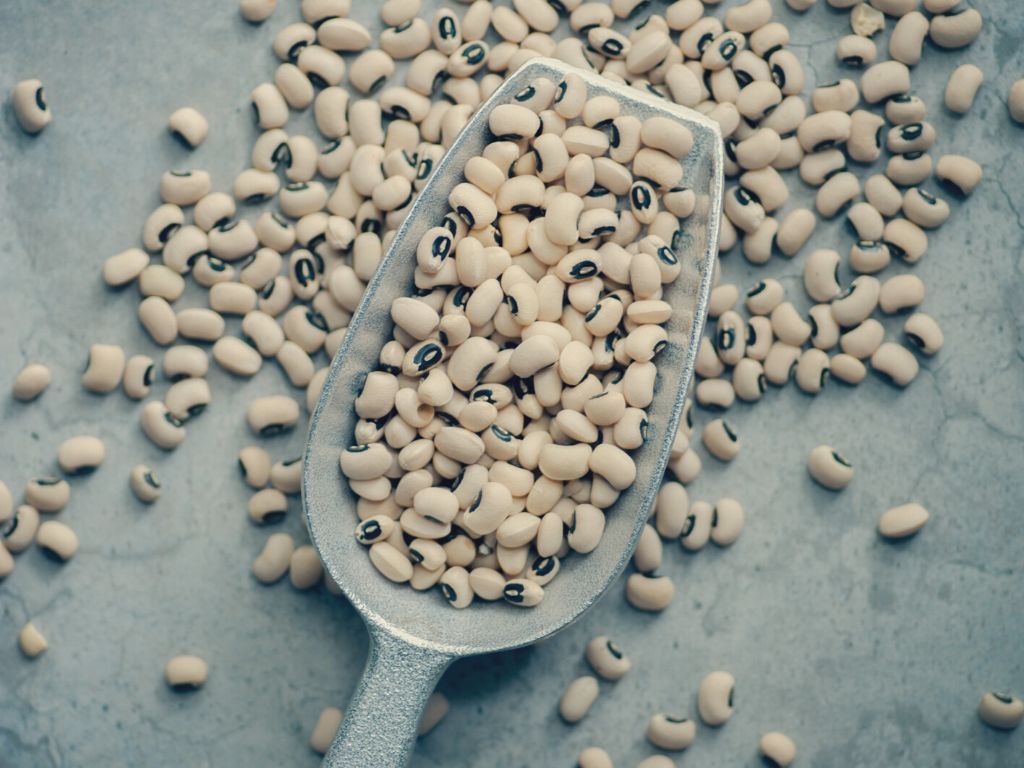
Black-eyed peas, also called cowpeas or lubias, are high in protein and highly efficient to grow. Now, Better Seeds, Israel’s largest and leading plant genome editing company, says it has engineered black-eyed peas in order to enhance the crop’s productivity for mass-scale production.
The modified black-eyed peas now stand up straighter and can be harvested the same way as soybeans. Better Seeds uses a unique genome editing technology, EDGE (Efficient Delivery of gene Editing), that enables the broad application of CRISPR across crops.
The soybean is used predominantly in animal feed. But it’s also a key ingredient in a range of foods as oil and protein. according to Better Seeds, the soybean faces threats from global warming, which is expected to lead to yield declines of at least 30 percent over the next decade.
Soy also requires large quantities of water and fertilizer and is more climate-dependent than other legumes, including the cowpea.

Better Seeds says the black-eyed pea is “exceedingly sustainable” offering “enormous nutritional and agronomic value.” It says the black-eyed pea is a leading legume candidate that can “fill the gap” soybean yield.
“If I had to choose one crop to focus on, its cowpea, since we are facing a huge shortfall in the supply of plant-based proteins, namely soybean, due to climate change,” Ido Margalit, Better Seeds CEO said in a statement. “Cowpea has the capability to fill in this gap pending its redesign to make it fit for mass-scale cultivation which is exactly what Better Seeds is doing. Cowpea will help to feed the world,” Margalit said.
“Better Seeds is committed to providing better crops which will solve the World’s looming food security problems. I believe that we will make an enormous impact.”
Prior to Better Seeds’ gene editing, the black-eyed pea was not a candidate for mechanized harvesting, which prevented mass-scale production. Instead, the crop must be hand harvested and often grown in developing countries where hand-harvesting is less expensive.
Better Seeds was able to redesign the black-eyed pea by targeting the gene that alters the plant’s architecture, allowing for it to stand upright like the soybean.
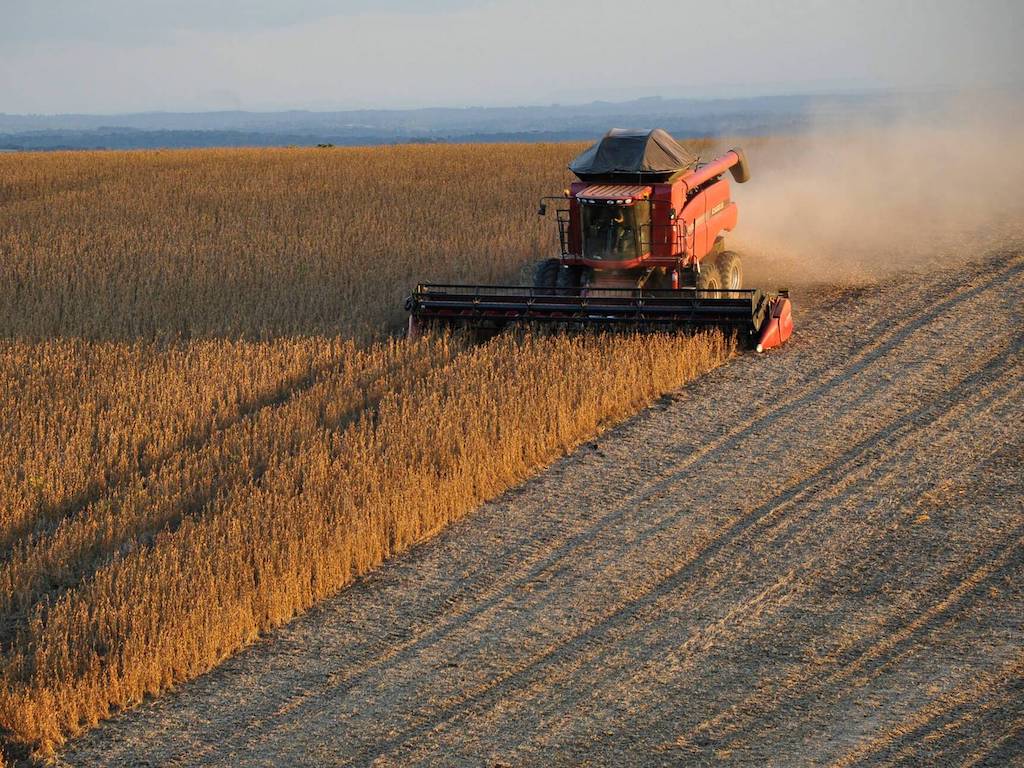
“With this redesigned cowpea farmers can both increase their versatility of legume cultivation, utilize their land all year round, and also ensure the market of sustainable supply of plant-based protein,” Better Seeds said.
Better Seeds says it is also bringing another key trait to the bean: herbicide resistance, which will further enhance its ability to meet the planet’s growing food security challenges.
The post New Tech Lets the Sustainable Black-Eyed Pea Contend With Soy at Scale appeared first on Green Queen.
This post was originally published on Green Queen.
Ahead of Valentine’s Day, PETA is erecting a towering message near St. Joseph’s Hospital urging people to avoid a broken heart by going vegan. Studies published in the Journal of the American Heart Association show that plant-powered eating reduces the risk of heart disease by a whopping 52%.
“Choosing vegan foods, including dark chocolate, is the best thing anyone can do for animals and their own health, because meat, eggs, and dairy are loaded with artery-clogging cholesterol,” says PETA President Ingrid Newkirk. “PETA is encouraging everyone to have a heart by enjoying delicious, vibrant vegan meals for Valentine’s Day and beyond.”
Vegan foods contain no cholesterol and loads of fiber, and they can lower the risk of suffering from heart disease, diabetes, various types of cancer, and other devastating health problems linked to eating meat, eggs, and dairy. PETA offers a free vegan starter kit on its website.
And of course, eating vegan benefits animals: Pigs, cows, chickens, and other animals commonly killed for food are smart, sensitive individuals who feel pain and fear, just as we do. Yet most of them are raised in filthy conditions and endure severe crowding and routine mutilations, such as castration and tail-docking—often without any pain relief—and don’t see the sun or breathe fresh air until the day they’re forced onto trucks bound for the slaughterhouse.
The billboard is located at 6915 Simmons Loop.
PETA—whose motto reads, in part, that “animals are not ours to eat”—opposes speciesism, a human-supremacist worldview. For more information, please visit PETA.org, listen to The PETA Podcast, or follow the group on Twitter, Facebook, or Instagram.
The post Sky-High Message in Tampa Seeks to Help Prevent Broken Hearts appeared first on PETA.
This post was originally published on Animal Rights and Campaign News | PETA.
Local diners just might think twice about chowing down on fried chicken after they see—and hear—“Hell on Wheels,” PETA’s new guerilla-marketing campaign featuring a life-size chicken transport truck covered with images of real chickens crammed into crates on their way to a slaughterhouse, complete with actual recorded sounds of the birds’ cries and a subliminal message every 10 seconds suggesting that people go vegan. It will debut in the heart of historic Old Town on Thursday before moving on to circle the Downtown Courthouse and the Albuquerque Convention Center and confront diners at Golden Pride, Frank’s Famous Chicken & Waffles, Chile Chicken Nashville Hot Chicken, Roti N.M. Rotisserie Chicken, and Vick’s Vittles Country Kitchen through Friday as part of the group’s national tour.
When: Thursday, February 9, 12 noon
Where: Old Town Plaza, 200 N. Plaza St. N.W., Albuquerque
“Behind every barbecued wing or bucket of fried chicken is a once-living, sensitive individual who was crammed onto a truck for a terrifying, miserable journey to their death,” says PETA Executive Vice President Tracy Reiman. “PETA’s ‘Hell on Wheels’ truck is an appeal to anyone who eats chicken to remember that the meat industry is cruel to birds and that the kindest meal is a vegan one.”
PETA—whose motto reads, in part, that “animals are not ours to eat”—opposes speciesism, a human-supremacist worldview.
For more information, please visit PETA.org, listen to The PETA Podcast, or follow the group on Twitter, Facebook, or Instagram.
The post ‘Hell on Wheels’ Is Coming: Squawking Chicken Truck to Ruffle Feathers Outside Albuquerque Restaurants appeared first on PETA.
This post was originally published on Animal Rights and Campaign News | PETA.
Following recently obtained U.S. Department of Agriculture reports documenting that at Fayette Packing Company near Eads, a worker kicked a lame, slow-moving pig twice and a cow was ineffectively shot in the head and left to cry out until a second blast ended the animal’s suffering, PETA sent a letter today to District Attorney General Mark E. Davidson urging him to investigate and file applicable criminal charges against those responsible.
“Fayette Packing Company is hell on Earth for animals, where a cow endured the pain and terror of multiple gunshots to the head and an already suffering pig was cruelly kicked,” says PETA Vice President Daniel Paden. “PETA is calling on the district attorney general to investigate these incidents and bring appropriate charges—and reminds everyone that the only humane meal is a vegan one.”
PETA points out that cows, pigs, sheep, chickens, and other animals feel pain and fear and value their lives, just as humans do. The group is pursuing charges under state law because federal officials haven’t prosecuted any inspected slaughterhouses for acts of abuse such as those at Fayette Packing Company since at least 2007.
PETA—whose motto reads, in part, that “animals are not ours to eat”—opposes speciesism, a human-supremacist worldview. For more information on PETA’s investigative newsgathering and reporting, please visit PETA.org, listen to The PETA Podcast, or follow the group on Twitter, Facebook, or Instagram.
PETA’s letter to Davidson follows.
February 6, 2023
The Honorable Mark E. Davidson
District Attorney General
District 25
Dear Mr. Davidson:
I hope this letter finds you well. I’m writing to request that your office (and a law-enforcement agency, as necessary) investigate and file applicable criminal charges against the individuals responsible for repeatedly kicking a lame pig and ineffectively shooting a cow in the head at Fayette Packing Company Inc., located at 16620 Hwy. 196 near Eads. The U.S. Department of Agriculture’s Food Safety and Inspection Service (FSIS) documented the incidents in reports that the agency recently made available to the public.
On July 19, 2022, an FSIS inspector saw that a worker “lifted his foot and delivered two kicks to” a pig who was “lame and moving slowly.”
Then, on August 25, 2022, an FSIS inspector saw that a worker shot a cow in the head with a captive-bolt gun. Rather than being stunned, the cow was left standing and crying out. A second shot was needed to end the animal’s suffering.
This conduct may violate TN Code § 39-14-202 and does not represent the “usual and customary practices … accepted by colleges of agriculture or veterinary medicine” otherwise exempt from prosecution. Please note that FSIS’ action carries no criminal or civil penalties and does not preempt criminal liability under state law for acts of cruelty to animals.
Thank you for your time and consideration.
Sincerely,
Daniel Paden
Vice President of Evidence Analysis
Cruelty Investigations Department
The post Feds See Cow Repeatedly Shot, Pig Kicked; PETA Seeks Criminal Charges appeared first on PETA.
This post was originally published on Animal Rights and Campaign News | PETA.
Ahead of February 14, a loving pair of cows are making a sky-high appeal next to Denny’s and IHOP—and within easy walking distance of several chapels in the “Wedding Capital of the World”—urging everyone to have a heart by going vegan.
“Like all mothers, cows fall in love, and mother cows love their babies, grieving and calling out for days after their calves are taken away from them,” says PETA President Ingrid Newkirk. “PETA is asking people to show love by leaving animals off their plates for Valentine’s Day and forever.”
Most cows in the meat industry end up confined to cramped, filthy feedlots, living mired in their own waste, often lame, and without protection from the elements. They’re commonly dosed with antibiotics to make them grow faster, they’re branded and castrated, and their horns are gouged or burned out of their skulls without any pain relief. Although they feel pain, fear, love, and joy, their lives are wretched and disrespected, all for the sake of a fleeting taste of their flesh.
Cows on dairy farms are repeatedly artificially impregnated and then traumatically separated from their newborn calves until their bodies finally wear out and they’re prodded up the ramp into the slaughterhouse. Mother cows used for their milk can be heard frantically crying out for their calves for days after they’ve been dragged away from them. Today there are wonderful alternatives to meat and dairy, from Beyond Burger and Fakin’ Bacon to oat milk and much more. PETA offers a free vegan starter kit on its website.
The billboard is located at 1830 S. Las Vegas Blvd.
PETA—whose motto reads, in part, that “animals are not ours to eat”—opposes speciesism, a human-supremacist worldview. For more information, please visit PETA.org, listen to The PETA Podcast, or follow the group on Twitter, Facebook, or Instagram.
The post ‘Don’t Kill Love!’ Giant Cows Propose a Vegan Valentine’s Day appeared first on PETA.
This post was originally published on Animal Rights and Campaign News | PETA.
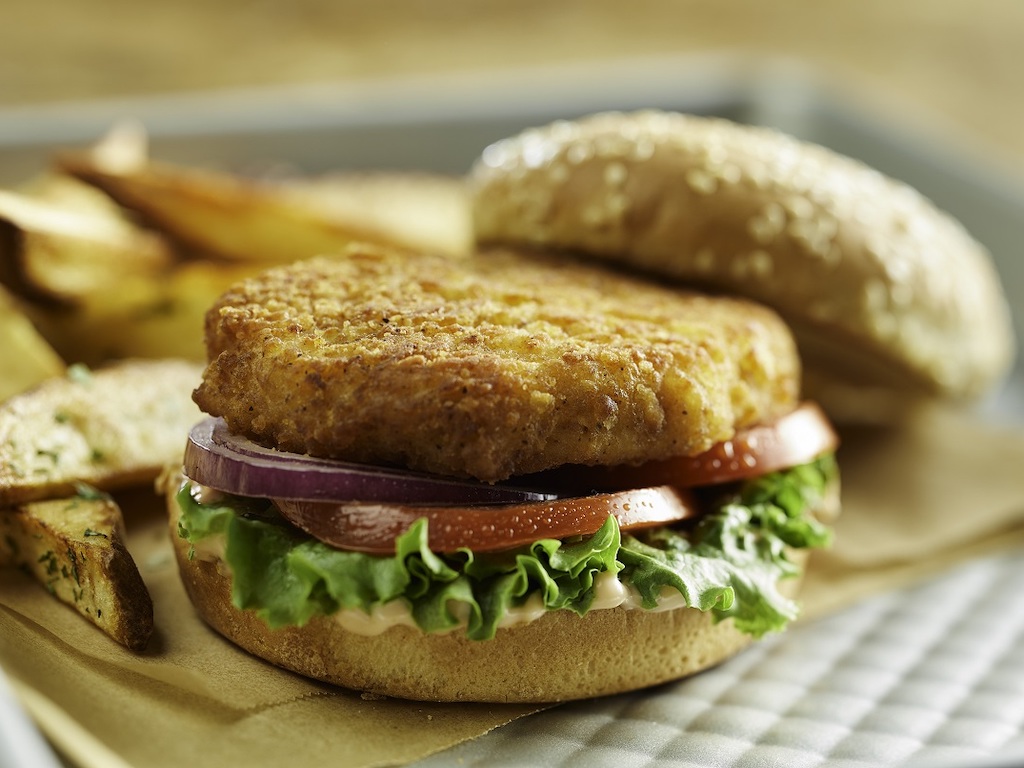
The new funding for Rebellyous Foods follows a $5.35 million raise in 2021, and a $6 million Series A round in 2020, according to Pitchbook.
In public regulatory filings with the Securities and Exchange Commission, Rebellyous said it’s aiming to raise more than $30.7 million in total. Previously investors include YB Choi of Cercano Management, angel investor Owen Gunden, and Mike Miller of Liquid 2 Ventures. There were at least 55 undisclosed investors in the latest round.
The company, which was launched in 2017 by former Boeing engineer Christie Lagally, says the new funding will be directed toward equipment for its plant-based meat. Rebellyous has been focused on vegan chicken nuggets, patties, and tenders to date.
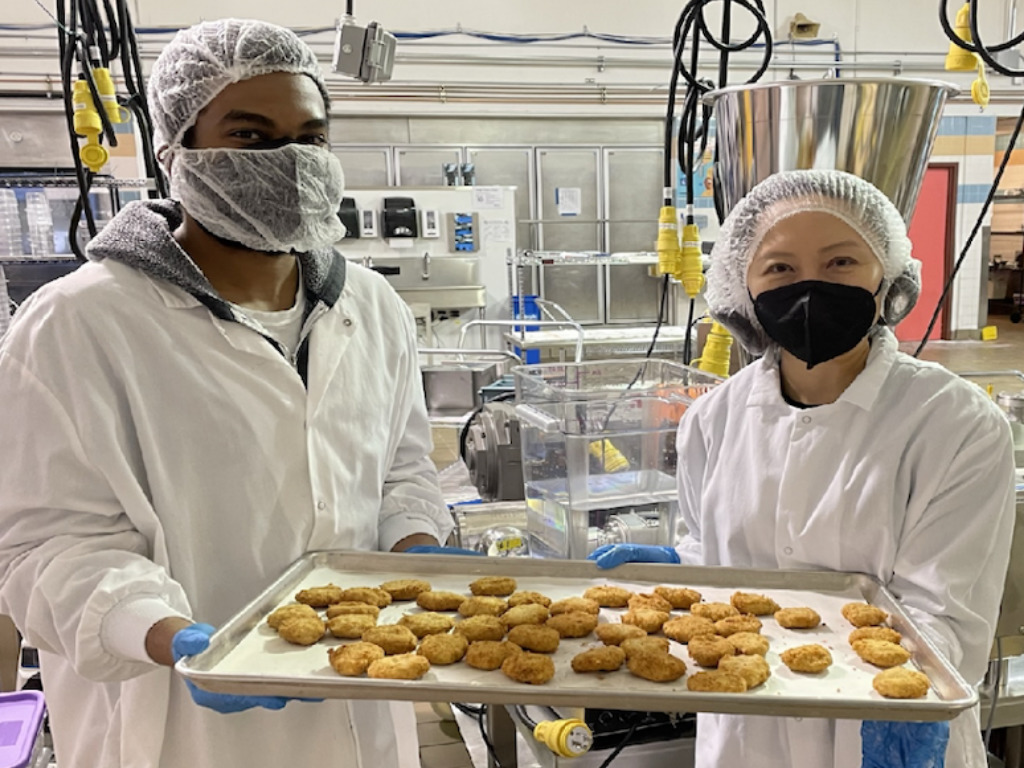
It’s now working to develop what it’s calling “Mock 2” — production equipment that can bring Rebellyous’ products to commercial scale.
“It’s food-processing equipment at its core,” Lagally told Geekwire. “But the whole point is not using old style meat processing equipment to make plant-based meat, which is not a very good fit.”
The funding comes as Rebellyous had a record-setting year in 2022, even as sales were down for category leaders including Beyond Meat.
Rebellyous saw retail increase to 1,100 stores in 2022. But the bulk of its business comes from food service; it’s a primary supplier of vegan nuggets for the National School Lunch Program (NSLP), serving 108 major school districts across the U.S.
The NSLP has been increasing its plant-based offerings to improve the health and sustainability of its meals in recent years.
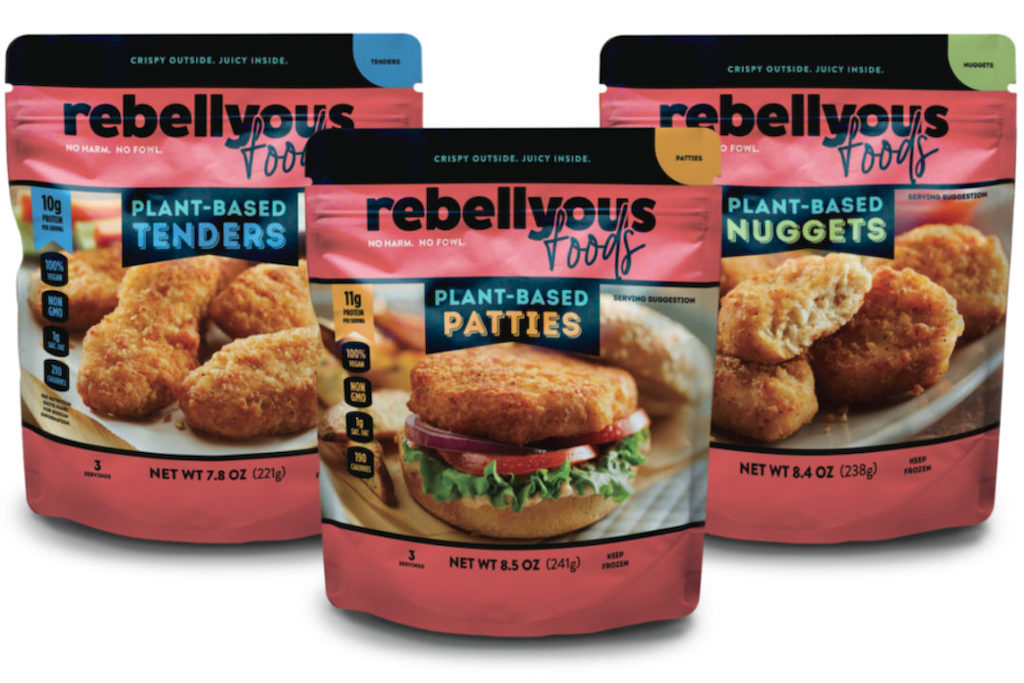
Last July, California earmarked more than $700 million to overhaul school lunch programs in the state, bringing an emphasis to increasing plant-based offerings.
“Many school districts across our state have a sizable student population that requires or wants plant-based or restricted diet options and cannot afford the sometimes-higher prices,” former Assemblyman Adrin Nazarian of Van Nuys said in a statement. Nazarian pushed the legislation forward, saying it’s a “sizable step” toward empowering schools to respond to their students’ needs.
“School lunch has been a fantastic place for us because it’s a good match for our model of price parity and profitability,” Legally said. “And you can’t fool kids — it has to be high quality.”
The post With 108 School Districts On Board, Rebellyous Foods Raises $9.5 Million to Scale Vegan Chicken appeared first on Green Queen.
This post was originally published on Green Queen.

It’s hard to think of someone who holds truth to power as effectively and as committedly as George Monbiot. The multi-award-winning British thinker, journalist, activist, and long-time environmentalist has been speaking out on the ills of capitalism and the climate crisis for almost 40 years, during which he has been attacked, arrested and shot at. Among the subjects that he has taken on throughout his storied career as an investigative journalist and as a Guardian columnist (a gig he started in 1996!) are indigenous land appropriation, neoliberalism and political corruption, and epidemic loneliness.
In his latest book Regenesis: Feeding the World without Devouring the Planet, he tackles our current food system crisis and explores the billion-dollar question of how to sustainably feed a growing global population without destroying our planet’s natural resources and exacerbating climate change.
Below, he talks to Green Queen‘s Sonalie Figueiras about why talking about food system change is so controversial, food tech and the S curve, the ‘mind-blowing’ alt protein products he has tasted, how to deal with Big Food lobbies, whether government regulation matters and what gives him hope after so many years of tireless activism.
Editor’s Note: This interview was recorded live on Wednesday, February 1st 2023 during the City University of Hong Kong’s Webinar Series The Future of Food: Seeking Sustainable Solutions. Watch the full video interview, including a Q&A with questions from students across Asia HERE.
The below transcript was edited for grammar and clarity.
Sonalie Figueiras: George, welcome. I’m going to dive right in. We are here to talk about your new book Regenesis. It’s your 12th book, I believe. What was the main thesis for writing this book, given you’ve written so many others?
George Monbiot: Thanks Sonalie. Yes, it does seem a bit greedy to have written so many books. [Laughs].
But I’ve been puzzling over this question for a long time as to why it is that we apply relatively strict standards to all industries except food and farming. And we create a sort of moral force field around those industries and say: Well, no, we don’t want to criticize them. We don’t want to go there.
And yet, food production is, by a very long way, the most damaging thing we’re doing to the planet. We all need food, we all need farming, we all need to eat. But the way we’re doing it is absolutely devastating to life on earth and to our own future prospects. It’s the number one cause of habitat destruction, the number one cause of wildlife loss, the number one cause of species extinction, the number one cause of soil depletion, of freshwater use. Most importantly, perhaps, and we always neglect this, of land use. And it’s also one of the major causes of greenhouse gas emissions, of water pollution, and of air pollution.
And yet, we don’t want to criticize it. And we don’t even want really to document what it’s doing, let alone find much better ways of doing it. It’s as if we just shy away from the issue except for a few tiny little tweaks around the margins, which just aren’t going to get [us] there.
So this huge central question, how do we feed the world without dividing the planet? That came to divide my mind and really dominate my thinking and my questioning over quite a few years. And so finally, I thought, right, I’ve just got to try to crack this as I can’t avoid it any longer. Because so many people have been avoiding it. I’ve got to tackle it head-on. And that led me into a really fascinating, and quite mind-blowing, intellectual adventure because so little of this issue is known outside very narrow scientific circles. And almost every day, I was coming across things, which made me go, wow! That changes everything! That is absolutely fascinating! Why doesn’t everyone know this? Why isn’t this on the top of the political agenda? And this was day after day after day.
Altogether, as well as doing extensive fieldwork, I read 5,000 scientific papers in researching this book. I just couldn’t stop. I became addicted to reading them, to chasing the citations trail and going on and on and on, to discovering these extraordinary things which specialists know, but the rest of us don’t, and we urgently need to.
Food production is, by a very long way, the most damaging thing we’re doing to the planet. We all need food, we all need farming, we all need to eat. But the way we’re doing it is absolutely devastating to life on earth and to our own future prospects.
Sonalie Figueiras: It’s become a bit of an obsession for me too so I understand very much what you mean.
You have been sounding the alarm about climate and food for a long time now. I actually found some of your columns from almost five years ago, I even found a Guardian article from 2008 making the connection between climate and meat production. So let me ask you, in the last couple of years, do you see a difference in people’s understanding of the connection between food and climate? Do you think it’s changing? Or do you think that most people still don’t know?
George Monbiot: I think most people don’t know. But I think it is also changing. I think we’re beginning to see the beginnings of the shift. We’re starting to see some people becoming much more aware than they were before. And that is beginning to ripple outwards. [But] It’s much too slow. I find so many times I’m having to start from first base with people, to say, right, okay, this is the problem. And yet, what we’re looking at is an even bigger issue than fossil fuels. You know, we finally got there with fossil fuels. It’s taken 30 years or so to persuade people that fossil fuels are a problem and to explain why fossil fuels are a problem. Still, some people deny it, because, well, of course they do. But we broadly got there. Most people are at least vaguely aware that fossil fuels are a problem and why they’re a problem. But the food system? You have to start from scratch again, and again, and again. And it’s frustrating, but that’s what educators are here to do.
Sonalie Figueiras: Do you think the media is doing a good enough job on that front? Other than folks like yourself?
George Monbiot: The media is not doing a good enough job on any front. [Laughs]
Sonalie Figueiras: One of the things that we’re seeing, as people in the industry is an increasing number of attacks from the meat and dairy lobbies on the solutions and alternatives that are being brought to market to solve for our addiction to industrial meat. How do we, as citizens, deal with this, given that most people are not even aware that lobbies are in play?
George Monbiot: I feel like I’ve been here before because I’ve been fighting the fossil fuel industry for so long. And they’ve been using exactly the same tactics. And in fact, they learned those tactics from the tobacco industry. In fact, some of the very same people who did the job for the tobacco industry went on to do the job for the fossil fuel industry. And it’s probably the same people, the same public relations, who are doing the same job for the livestock industry. And they are clever people, they know how to get into your mind. They know what persuades people and what doesn’t. And so they just find all these ways of trying to keep people hooked on the current meat-based economy and demonize any attempts to address that.
And I think you’ve just got to realize this is the sea in which we swim. It’s pointless to even complain about it, you know. This is the circumstances [we find ourselves in]. We are up against massive industrial lobbies who will fight with every dirty trick in the book to try to sustain their position and prevent themselves from being out-competed. In the past, some of these lobbies have been very successful. It’s like how the motor industry and the oil industry nixed electric cars going back a century now- they just stopped the development of electric cars.
We can’t afford to let that happen. And so we have to fight them. And we fight them by making the case again and again. And by making it as well as we can, as creatively as we can. We use the facts, we use the data, the scientific figures, which are very well established, and we get them out there. It’s not enough just to reel off facts and figures. We have to embed them within narratives, within the stories which are going to reach people. And we have to be as clever and creative as possible in doing so.
Often, people who see themselves as environmentalists are actually defending the old against the new regardless of what the environmental impact of that is.
Sonalie Figueiras: One of the more worrying things that we’re seeing is vegan advocates joining forces with pro-pastured beef/regenerative ag advocates. It makes for very strange bedfellows, but this is happening. What is this all about?
George Monbiot: It is peculiar and disturbing, but we’ve seen it before. And, and also often, people who see themselves as environmentalists are actually defending the old against the new regardless of what the environmental impact of that is.
To give you an example in another sector: I know several people who refuse to have a microwave oven in their house because they think it’s going to kill them. Now, there’s no evidence whatsoever that a microwave oven harms you. But the very same people in every case have a wood-burning stove in their house, which absolutely can kill you because of the very dangerous particulate emissions that it creates. But they think that wood burning stove is green. And the microwave oven is not because the wood-burning stove is old, and the microwave oven is new.
Often what we’ve got is a phobia of new stuff, a sort of almost a sort of comfort reaction of regard to cling to the old stuff. And this is why you see this bizarre situation of environmentalists supporting pasture-fed meat, which is the most damaging farm product on Earth. That is what has destroyed more rainforests, more wetlands, more savannas, and more habitat in general than any other food product. It’s what’s driven more indigenous people off their land than any other food product. It’s what produces more greenhouse gas emissions than any other food product. It has the biggest carbon and ecological opportunity costs of any product…
But it’s old. Very, very old. It goes back to the Neolithic [period]. People were herding cattle 10,000 years ago, and so, it’s good. Old is good. And the very same people will attack anyone who’s trying to produce plant-based or microbial-based meat substitutes to appeal to people who aren’t going to go vegan but want to eat something like meat that doesn’t come from animals. And because that’s new. It’s scary. It’s new. And it will be made in factories. Well, all the food we eat passes through a factory before it reaches us. So these are scare words like factories… where do you think your food comes from? It might be grown in fields, but it’ll pass through a factory before it reaches you. Even if it’s just a package, it will go through a factory.
All successful new technologies, whether it’s the laptop, I’m speaking on to you on whether it’s this [shows his iPhone], whether it’s the refrigerator, whether it’s a car replacing horses and carts, they all follow this S curve adoption...What we’ve seen happening in the last few months suggests that we’re beginning to move into the second phase of the S curve, which is off the bottom and just starting to climb.
Sonalie Figueiras: It reeks of a certain type of elitism that is really dangerous.
Let’s dive into the alternative technologies. You’ve been tasting and sampling some of them lately. Do you feel most people are aware of the many alternative protein technologies from cultivated meat to microbial fermentation and precision fermentation to plant-based meats 2.0? Are we having an effect in terms of getting the word out? It’s been interesting to see you embrace these new technologies. What made you get behind them?
George Monbiot: With the new food technologies, we’re at the bottom of the S curve. Now, all successful new technologies, whether it’s the laptop, I’m speaking on to you on whether it’s this [shows his iPhone], whether it’s the refrigerator, whether it’s a car replacing horses and carts, they all follow this S curve adoption. For quite a few years, they bump along the bottom and not much seems to be happening, and they have various setbacks, and people say: ‘Oh, the sector is collapsing…you know…there’s not much going on’, and uptake is just 1 or 2%. And you see big fluctuations because you have a low baseline. And then what happens is the price starts to come down, the scale starts to go up, and the quality starts to improve. This has been the case with all of these technologies, even artificial ice as opposed to river ice. The transition has always been the same. There have always been scare stories around new technologies. And so it bumps along the bottom, then it begins slightly to uptick and you’ll see a slow rise to about 10% market penetration, and then it just goes straight up. It’s slow, then sudden. And that’s the S curve adoption. And we see that again, and again, all the way through history.
At the moment, we’re still at the bottom of the S curve for new technologies like precision fermentation, like realistic alternative meats made out of plant or microbial products, [like] cell-cultured meat and the rest of it. I think the answer is going to be a hybrid of all three incidentally, but we’re right at the beginning of this, and most people either don’t even know about it, or say ‘Oh, that’s not for me, you know, I don’t see myself as the sort of person who might eat those things’. And that’s, that’s totally familiar from the whole history of industrial change. That’s how it’s always been.
And what we’ve seen happening in the last few months suggests that we’re beginning to move into the second phase of the S curve, which is off the bottom and just starting to climb. And, and that’s been several quite dramatic breakthroughs. One has been the first approval for cell-cultured meat in Singapore, and in the US.* Another has been the radically improved quality of plant-based meat substitutes. Now that I’m plant-based, I don’t feel any need to eat meat substitutes, but these aren’t aimed at me. And they’re not aimed at you. They’re aimed at the great majority of people who want to eat something like meat.
I’ve eaten recently three sets of products, which are quite mind-blowingly similar to what they’re imitating. So much so that if it were a blind tasting, you really would not know the difference. One is a steak made by a Slovenian company called Juicy Marbles. One is lamb fillet and beef fillet made by an Israeli company called Redefine Meat. And the other is a whole series of sushi and tempura products made by a restaurant in London called 123V. And in every case, it’s like: ‘II can’t believe I’m not eating the original!’ In fact, it’s quite disturbing for someone like me and you. ‘This doesn’t feel right.’ [Laughs].
So I think we’re seeing these very major breakthroughs. We’re gonna see the costs come down, a lot more competition coming in and the costs will start coming down and as that happens, adoption will start to tick up. People in the industry are saying we’re likely to reach cost parity about the middle of this decade. But then the takeoff for the S curve will be in the 2030s, that’s what they reckon.
*Editor’s Note: Cultivated chicken company Upside Foods earned GRAS status from the FDA in November, meaning its chicken meat made from cells was deemed safe to eat by the US agency. It has yet to obtain USDA approval.
The regulatory issues are really the big sticking point in Europe. And in the UK, in the UK, our food regulator, like everything else in the UK, is underfunded and overwhelmed and just can’t cope.
Sonalie Figueiras: Do you think we can get there without government intervention in the form of incentives, or regulation?
George Monbiot: Well, we need some government action. A lot of the time, it’s about government getting out of the way. Because we have governments responding to lobby groups by saying, oh, you can’t call it milk. You can’t call it cheese. You can’t call it meat or sausages or burgers unless it’s come from an animal. Which is slightly confusing because there’s a whole load of products for which they’re perfectly happy for this food literalism not to apply. What about peanut butter? What about coconut? What about Jelly Babies? Are they babies? What about buffalo wings? Do buffaloes have wings? And hot dogs! You ban vegan hotdogs on the basis that they don’t have any meat in them, well why don’t you ban meat hotdogs on the basis that they don’t have a dog in them? This is just bullshit responses to industrial lobbying. But unfortunately, a lot of governments are responsive to that lobbying.
The regulatory issues are really the big sticking point in Europe. And in the UK, in the UK, our food regulator, like everything else in the UK, is underfunded and overwhelmed and just can’t cope with the volume of applications mostly for cannabidiol CBD applications. It’s just been completely flooded with them. And it can’t get through those to get to the alternative protein applications.
And then the EU has this regulatory process where it’s meant to take two years for a novel food application to get adopted. But that process can be suspended at any time. And so what you’ve got is industrial lobbyists, the animal agriculture lobby, putting huge pressure on the regulators by bombarding them with lots of objections. And then they say: ‘Oh, it’s too complicated! We’ll just suspend the process.’ And then it stays in limbo for years, potentially. And so these products can’t then get adopted and they cannot reach the people who want to eat them.
I draw inspiration also from the knowledge that things can change very, very quickly...Once you can reach 25% of the population, and persuade them to get behind a new idea, then that change becomes very hard to stop.
Sonalie Figueiras: Yes, that does slow things down. How do you find the inspiration and strength to continue amidst attacks and the lack of good news and lack of progress? Where’s your hope?
George Monbiot: Yes, it is exhausting and difficult. And it is a struggle. It is a constant struggle. I’ve been doing this for 38 years now. But I draw inspiration from the young people who are stepping forward, the amazingly brave people who are often prepared to risk prison in order to defend the living world and defend the prospects of their own generations.
I draw inspiration also from the knowledge that things can change very, very quickly. Society is a complex system, and all complex systems have tipping points. And with society, we know where the tipping point is- it’s about 25% of people dedicated to a new approach. Once you can reach 25% of the population, and persuade them to get behind a new idea, then that change becomes very hard to stop. And the reason for that is partly the internal dynamics of the complex system called society. But partly that we are hyper-social mammals. And we’re always testing the wind to see which way it’s blowing. And if we perceive that the wind has changed, we swing around to catch that wind. And so the great majority of people never need to be persuaded. They just need to feel that things have changed, and they’ll fall in line with that change. Of course, highly repressive and authoritarian governments can stamp out that change. But in any government, which at least pretends to be a democracy, it’s very hard for them to stop it. And so what we can see is a situation which seems hopeless, we feel, you know, we can’t get anywhere and go on forever fighting people one by one. But actually, we’re not taking into account the dynamics of complex systems and how they operate. And so this above all else gives me hope that things can move much, much faster than we imagined possible.
Sonalie Figueiras: A wonderful message of hope to finish on. Thank you so much, George.
Regenesis: Feeding the World Without Devouring the Planet by George Monbiot is published by Penguin (£20) – order now.
The post Lobbies, Food Tech & Neophobia: In Conversation with George Monbiot About How To Feed The World Without Devouring The Planet appeared first on Green Queen.
This post was originally published on Green Queen.
The night of February 2 marked the final vigil at Farmer John slaughterhouse in Vernon, California to honor the memory of the millions of pigs murdered there. PETA supporters—including Joaquin Phoenix—and other activists have campaigned for Farmer John’s shutdown for years in light of the horrific conditions pigs faced at the Smithfield-owned murder plant. The vigils have been held biweekly since 2017, and pig-defenders gathered there to protest against injustice and offer exhausted, dehydrated pigs water in the transport trucks.
In spite of the long, dangerous journeys in extreme temperatures without food or water on crowded transport trucks endured by the estimated , Farmer John slaughterhouse was covered in pastoral images of happy pigs in vast, luscious fields of grass. But never in their entire lives did the pigs killed in this hellhole get to see, smell, or stand on grass. It was an insult to the miserable existence forced upon them, and PETA wouldn’t stand for it: We hacked their murals with stickers that encouraged public attention instead of the apathy Smithfield hoped to invite.
Students Opposing Speciesism, a PETA-backed youth-led organization, stuck up for pigs’ rights, too: They surrounded the slaughterhouse to challenge cruelty to pigs and other animals killed for food. During the COVID-19 pandemic, Farmer John seemed to get worse and worse. It remained a filthy killing operation trafficking in exhausted travel-weary pigs, and it even earned the dishonors of a coronavirus safety fine from the California Division of Occupational Safety and Health. Secured in places by 10-foot walls topped with razor wire, the facility looked like a prison.
Pigs are social, playful, protective animals who bond with each other, make nests, relax in the sun, and cool off in the mud. They’re known to dream, recognize their own names, and even show empathy for other pigs who are distressed. Just like humans, some love to cuddle, while others prefer their own space.
With Farmer John closing, there’s one less horror story to worry about. But there are still many heinous injustices done to pigs. Please take a moment to help defend them.
The post Good Riddance to Farmer John, Which Killed an Estimated 7,000 Pigs Daily appeared first on PETA.
This post was originally published on Animal Rights and Campaign News | PETA.
Super Bowl LVII will kick off on Sunday, February 12, at State Farm Stadium in Glendale, Arizona. There’s one thing you just can’t go without for the big game—vegan chicken wings, of course! So to make sure you have your favorite savory snack before kickoff, we’ve found some of the top vegan wings in the greater Phoenix area, many of which are available near the stadium.
In 2021, humans consumed nearly 1.5 billion chicken wings—at least 350 million individual chickens—during Super Bowl weekend alone. For the 2023 Super Bowl, help spare chickens by piling your plate with these game-changing vegan wings from restaurants all across the Valley of the Sun.
Green New American’s wing platters are perfect for Super Bowl parties. They’re served with a house-made ranch dipping sauce, and they’re available in three flavors: Buffalo, Espresso BBQ, and “Huney” Jalapeño.
The Buffalo Bills may not be in the Super Bowl this year, but these crispy drumstick-style wings are positively smothered in a spicy Buffalo sauce. Cool them off with a dip in the zesty house-made ranch dressing.
Picazzo’s vegan menu is full of flavorful options, including the Vegan Chick’n Bites, which are served with vegan ranch and carrot sticks. They’re available in five tasty flavors: Italian Seasoned, BBQ Original, BBQ Chipotle, Buffalo, and Spicy Thai Peanut.
For an elevated take on the game-day dish, head to Vegan & Vine for its Buffalo Cauliflower appetizer, which features crispy, spicy cauliflower with ranch and a tangy vegan gorgonzola cheese.
Hot Sauce and Pepper is a food truck based in Mesa that offers vegan comfort food, including its signature Caulifyah Wings. These deep-fried bites are crispy and saucy and are even available gluten-free. Choose from three flavors: Sweet Mambo, Spicy Mambo, and Hot. Arrange for pickup or local delivery, or find the truck at one of its pop-up locations.
Nana’s Kitchen food truck is based in Chandler, where it’s serving crispy cauliflower Wangz that come in six flavors: BBQ, Korean BBQ, Lemon Pepper, Sweet Heat, Buffalo, and Jerk.
Yard House is a sports bar chain with a menu full of vegan options, including Gardein Wings, which come in three flavors: Buffalo, Ancho BBQ, and Whiskey Black Pepper. (Just be sure to replace the nonvegan side of ranch with spicy tahini or another vegan sauce option.) With three locations in Glendale, Scottsdale, and Phoenix, it’s also a great spot to watch the game if you can’t attend in person.
Check out the top 10 vegan wings in the U.S., along with some of the best picks in Kansas City, Missouri, and Philadelphia.
Grocery stores are stocked with vegan wings, so it’s easier than ever to make them at home. You can also make a huge batch of crispy cauliflower wings, which are great if you’re on a budget!
Now that you’ve sacked wings taken from actual chickens, do more to help the most abused animals on the planet. Click below to take action for chickens:
The post You Can’t Miss These Vegan Wings Near State Farm Stadium in Glendale, Arizona appeared first on PETA.
As the Ellsworth community rallies around fundraising efforts for candlepin bowling alley D’Amanda’s, PETA sent a letter this morning to its owner (and sole employee), Autumn Mowery, offering to pitch in by paying to place a pro-vegan ad above the pin decks.
PETA notes that interest in lifesaving vegan meals has skyrocketed, with a 300% increase in the number of vegans over the past 15 years. And since vegans are less prone to heart disease, cancer, and diabetes than meat eaters are, going vegan would help D’Amanda’s loyal customers keep their balls rolling for many years to come.
“Between saving animals’ lives and protecting diners’ health, going vegan is like bowling a 300,” says PETA President Ingrid Newkirk. “PETA would be delighted to bring our lifesaving message to D’Amanda’s patrons and help breathe some life into this beloved business.”
PETA hopes its ad will inspire Mowery’s fiancé, Ryan Lounder, who owns the bowling alley’s bar and restaurant, Strike N’ Slice, to offer hearty vegan options, such as pizza with dairy-free cheese and veggie burgers. He’d be in good company: According to market research firm Datassential, the number of “plant-based” options on U.S. restaurant menus has increased 2,800% since 2018.
PETA—whose motto reads, in part, that “animals are not ours to eat” and which opposes speciesism, a human-supremacist worldview—offers free vegan starter kits to help anyone make the switch. For more information, please visit PETA.org, listen to The PETA Podcast, or follow the group on Twitter, Facebook, or Instagram.
PETA’s letter to Mowery follows.
February 3, 2023
Autumn Mowery
Owner and General Manager
D’Amanda’s
Dear Ms. Mowery:
I’m writing on behalf of People for the Ethical Treatment of Animals—PETA entities have more than 9 million members and supporters globally—in response to the fundraiser you’ve organized to keep D’Amanda’s candlepin bowling alley running, hire additional employees, and give your business some tender love and care. We have an offer that could score you some funding during this difficult time: We’d like to pay to place this eye-catching ad that reads, “Spare Animals. Get Your Health out of the Gutter: Go Vegan. PETA” above the pin deck.
According to the Academy of Nutrition and Dietetics, going vegan reduces an individual’s risk of developing diabetes by 62%, their chance of being hospitalized due to a heart attack by 33%, their risk of suffering from heart disease by 29%, and their risk of developing cancer by 18%. Vegan eating is also linked to a decrease in the risk of developing obesity, since vegans are about 18% thinner and 10 to 20 pounds lighter, on average, than their meat-eating counterparts.
Vegan businesses are thriving in the U.S.: The vegan market is expected to grow by 451% within the next 10 years, and the number of vegan options on restaurant menus has exploded by 2,800% since 2018. In addition, the number of people going vegan has skyrocketed—there’s been a 300% increase in the U.S. over the past 15 years, and more than half of all U.S. households now buy vegan food products. People are recognizing that vegan diets are more accessible and cost effective and can help reduce food bill costs by one-third, according to a University of Oxford study.
Consuming meat, eggs, and dairy has long been known to be unhealthy and unnecessary, and that’s why we, as a society, need to aim higher. I look forward to hearing from you to get the ball rolling on this win-win offer. Thank you for your consideration.
Very truly yours,
Ingrid Newkirk
President
The post Will Candlepin Bowling in Ellsworth Alley Score Funds From PETA? appeared first on PETA.
This post was originally published on Animal Rights and Campaign News | PETA.
The post Spare Animals, Get Your Health Out Of The Gutter: Go Vegan. appeared first on PETA.
This post was originally published on Animal Rights and Campaign News | PETA.
The post I Never Lent You My Flesh. Go Vegan. appeared first on PETA.
This post was originally published on Animal Rights and Campaign News | PETA.
BREAKING: Federal officials found that at least 31 children as young as 13 were allegedly employed illegally as night sanitation workers at slaughterhouses in the Midwest—including JBS Foods slaughterhouses in Grand Island, Nebraska, and Worthington, Minnesota.
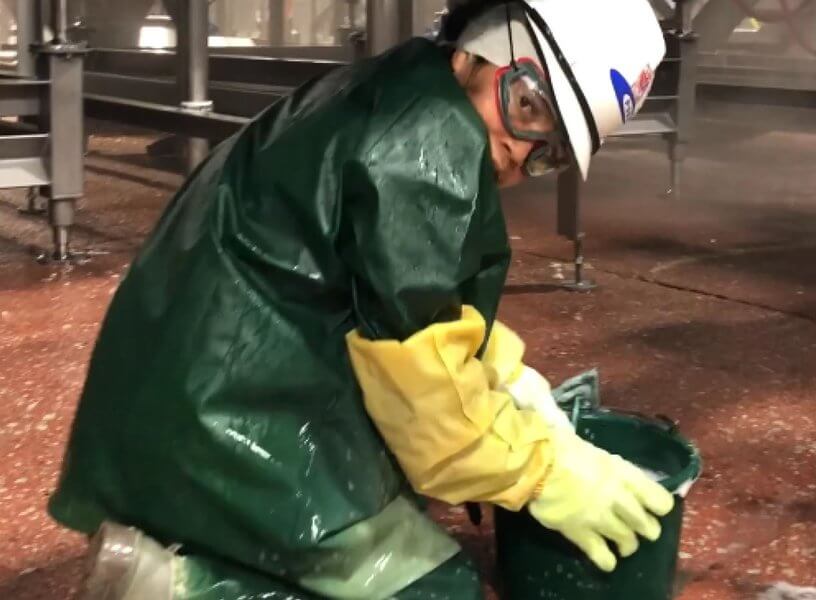
U.S. Department of Labor officials interviewed this worker at a ground beef floor at a JBS USA meat processing facility in Grand Island, Nebraska as part of an investigation into alleged child labor practices by Packers Sanitation Services. (Photo filed by U.S. Department of Labor)
The children were allegedly working in hazardous conditions. Investigators found that some worked at the facilities overnight and had burns on their hands because of exposure to cleaning chemicals. Federal investigators are now looking into whether these children are victims of illegal labor trafficking.
If JBS Foods Can Excuse Illegal Child Labor, Imagine What Happens to Animals at JBS Slaughterhouses
In addition to the alleged child labor violations at the JBS Foods slaughterhouses, PETA has obtained documentation revealing the egregious abuse of other animals at these vile facilities.
Some cows at this JBS slaughterhouse were FULLY CONSCIOUS when workers hung them upside down & SLIT THEIR THROATS.
Flowers don't need to have their throats slit.
PETA will pay workers from the recently closed JBS slaughterhouse if they quit and become flower-arrangers instead. pic.twitter.com/LmiAybkJlV
— PETA (@peta) April 9, 2020
At the slaughterhouse in Grand Island, federal officials documented that workers beat cows and deprived them of water. Additionally, the facility has a history of botched shootings of cows, including in November 2021, when staff repeatedly shot two cows in the head before rendering them unconscious.
In June 2020, a bleeding steer who had been shot in the head tried desperately to escape slaughter. Thirteen minutes passed before workers repositioned the terrified animal for a second shot. In March 2018, workers apparently failed even to attempt to stun a cow before shackling her and hoisting her onto a bleed rail while she was still conscious.
In 2017, a concerned whistleblower provided PETA with photographs and video footage documenting that cows had been shot in the wrong area of their heads, which may not have properly stunned them, and that a conscious cow—whose throat had been slit—had been hanging on the bleed rail.
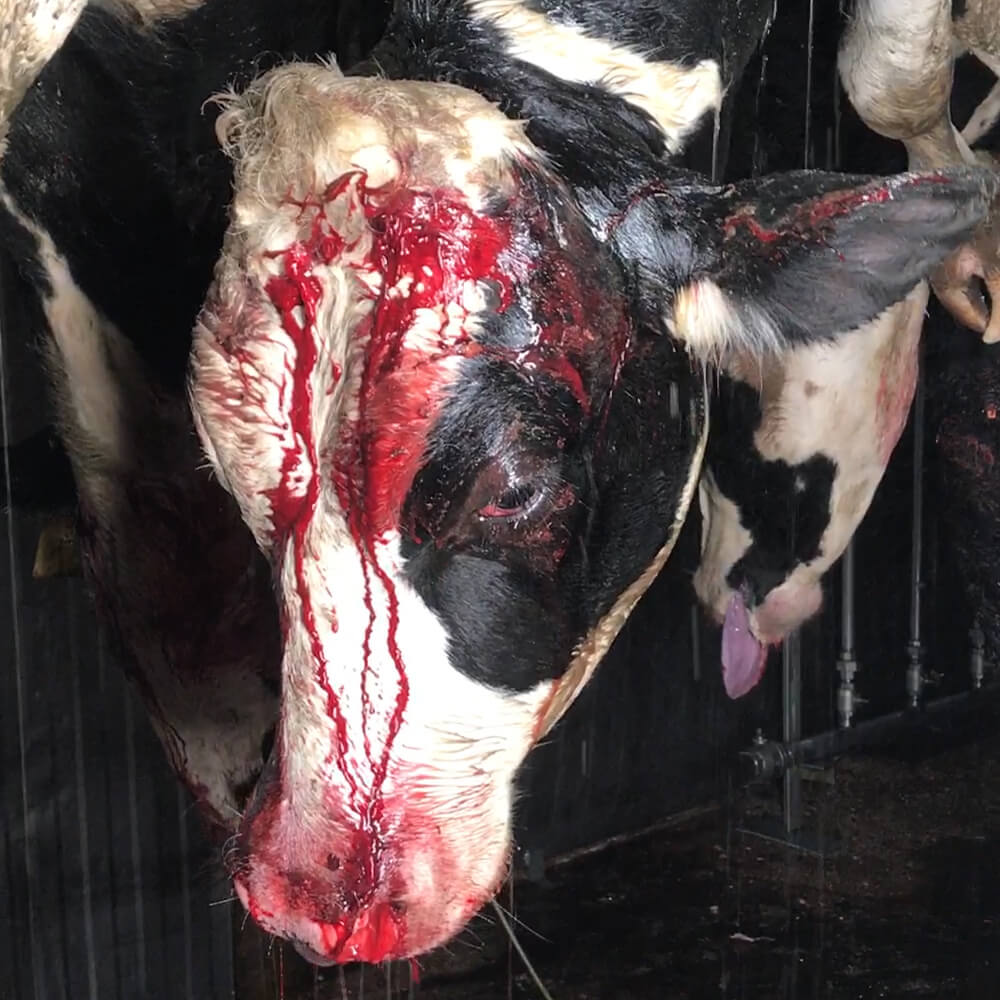
In 2017, PETA obtained disturbing photographs and video footage captured by a whistleblower inside JBS Beef’s slaughterhouse in Grand Island, Nebraska, revealing improper slaughter procedures.
Whistleblowers have also alleged that JBS forced cows to languish in idling trucks outside the Grand Island facility for up to 10 hours before being unloaded, causing extra suffering.
At the JBS slaughterhouse in Worthington, workers were seen lifting paddles above their heads and repeatedly striking pigs, according to a federal report.
Here’s What YOU Can Do
This recent investigation is yet another reminder that companies that raise our fellow animals for slaughter have no regard for the lives of sentient beings—including human children, apparently. The best way to take action against the suffering of humans and other animals at slaughterhouses is to go vegan. Click the button below to get started today:
The post BREAKING: Children as Young as 13 Illegally Working in Hazardous Conditions at JBS Slaughterhouses, Officials Allege appeared first on PETA.
This post was originally published on Animal Rights and Campaign News | PETA.

Supermarket sushi giant Kikka Sushi has announced vegan tuna and salmon sushi coming to Whole Foods Markets’ sushi counters, Konscious Foods comes to freezers, and restaurants go all-in on plant-based fish.
Kikka, a Whole Foods partner for more than 30 years, is using the vegetable root konjac in proprietary preparations to replicate the taste and texture of raw salmon and tuna. The launch is part of Kikka’s five-year mission to create vegan sushi offerings that mimic the taste and texture of conventional seafood. The sushi is rolling out to select locations nationwide.
Kikka’s launch comes on the heels of the November launch of Konscious Foods, a Vancouver-based vegan sushi brand coming to freezer sections. The company is the brainchild of Yves Potvin who launched the popular vegan brands Yves Veggie Cuisine and Gardein.
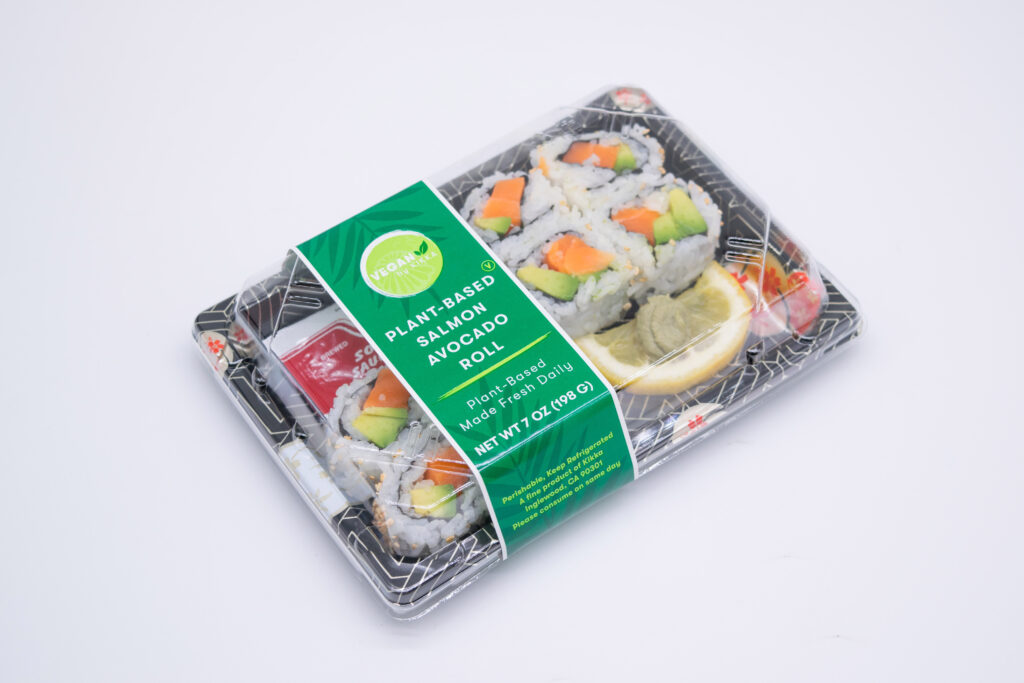
Konscious Foods marks the first time a sushi range comes to freezer sections. It will feature eight products including four sushi and four onigiri rolls for retail and food service.
“At Konscious, our chefs create plant-based seafood that people can choose over traditional options for their own health and the health of the planet,” Potvin said in a statement. “We saw a gap that wasn’t being filled. People want choices, regardless of whether that’s for meat or seafood. Here we match the delicious taste of plant-based sushi and onigiri with the convenience of ready-to-eat meals and snacks.”
Last month, Dutch-based Vegan Zeastar announced “the world’s first” range of vegan sushi and poke bowls, which it served up at a regional food service trade show. The range included palm-oil-free vegan nigiri, sashimi, uramaki, gunkan, handrolls, or poke bowls.
Vegan sushi isn’t just coming to supermarkets, though. Restaurants are increasing their options. Vegan sushi bar Kusaki in West Los Angeles is bringing the city its first plant-based omakase experience. Kusaki is offering a mix of appetizers, sashimi, nigiri, and hand rolls with plant-based salmon nigiri and a crispy garlic tuna carpaccio made from tapioca.

Jeffrey Best and Ken Jones, two longtime bar and restaurant operators, are also opening a vegan sushi restaurant, APB (All Plant Based), coming to West Hollywood. APB will be a vegan sushi bar with a menu by Niku Nashi.
Plant-based sushi offerings aren’t new to LA — Shojin in Little Tokyo and Culver City have been vegan destinations since 2008. And other sushi spots including Highland Park’s Ichijiku and Fiish in Culver City’s Platform mall offer a range of vegan items.
Asian-inspired Planta Queen recently opened in New York City near the Empire State Building. It offers a range of sushi items as well as other Asian dishes including bao, dumplings, and noodle dishes.
The post 2023: The Year of Vegan Sushi appeared first on Green Queen.
This post was originally published on Green Queen.
“I was sick of talking about my boyfriends and my boobs all the time. But I thought if I can attach it to animal activism or activism for the environment, then it meant something. So I joined forces with PETA,” Pamela Anderson says in the new Netflix documentary about her life, Pamela, a Love Story.
Twenty-six years ago, Pamela made her PETA debut with her “Give Fur the Cold Shoulder” billboard in Times Square. Since then, she has become an honorary director of PETA and has been involved in countless campaigns and victories for animals. Whether by writing letters, starring in public service announcements, or traveling around the globe to talk to world leaders, she has been instrumental to PETA’s efforts.
@officialpeta #PamelaAnderson is truly an inspiration—so proud of our honorary director & all the incredible work she’s done to help animals!
 Photo: © William Hawkes
Photo: © William Hawkes“Activism is sexy, and you have to be brave, and you gotta use what you got!”
We’ve only scratched the surface of Pamela’s phenomenal work—you can check out more here!
Pamela never misses an opportunity to get active for animals. If you feel inspired by her documentary and her outstanding advocacy, consider joining the PETA Action Team. As a member, you’ll help defend animals, write letters to local news editors, assist with urgent cases, and attend protests and other events in your area—and that’s just the beginning.
Take a stand for animal rights, just as Pamela does. Click the button below to learn more about joining the team:
The post ‘PETA, a Love Story’ With Pamela Anderson appeared first on PETA.
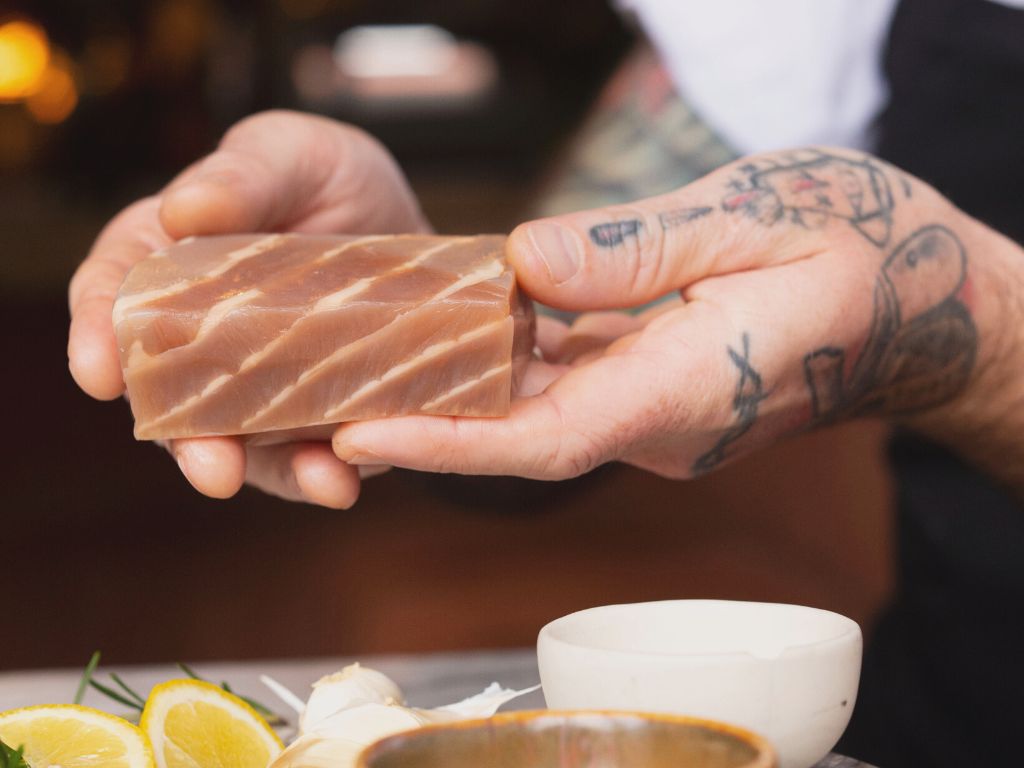
New School Foods’ vegan fish release comes on the heels of $12 million in Seed funding from Lever VC, Blue Horizon, Hatch, Good Startup, Alwyn Capital, and grants from multiple Canadian government grant agencies including Protein Industry Canada.
New School says its whole-cut fish is made with plant fibers that replicate the diameter, length, strength, and structure of fish muscle fibers to deliver the same texture and mouthfeel of fish.
It joins a growing category of startups tackling whole-cut fish. Last summer, Revo Foods announced a 3D-printed whole cut salmon and Indian vegan seafood startup SeaSpire unveiled a plant-based snapper filet created using bio-printing.
There’s an increasing demand for seafood that’s free from heavy metals such as mercury. Consumers are also becoming concerned about microplastics in their seafood. Several studies have found microplastics in a range of seafood products including a number of fish species, scallops, and mussels.
New School Foods also says it has achieved a plant-based fish that comes in a raw state — a feat made possible by a cold-based processing technology. Most of the whole-cut plant-based options come to consumers pre-cooked.
The company’s unique scaffolding technology uses directional freezing to create scaffolds that mimic muscle fibers and connective tissues found in meat and fish. They’re then infused with different proteins and flavors that mimic the taste, texture, structure, and cooking process of live meat and fish.
“The next frontier of meat alternatives is whole cuts, and from day one we understood that New School Foods needed to solve two heavily connected issues: the quality of the meat alternatives in-market and the limited toolkit our industry uses to produce them,” Chris Bryson, CEO and founder of New School Foods, said in a statement.
“What’s generally available for consumers now are rubbery, ground, pre-cooked products that will not convince the average customer to change their lifelong habits,” he said.
New School says its tech was designed to be scalable from day one; its production technologies will allow it to maintain its texture, mouthfeel, and macrostructure at maximum production capacities.
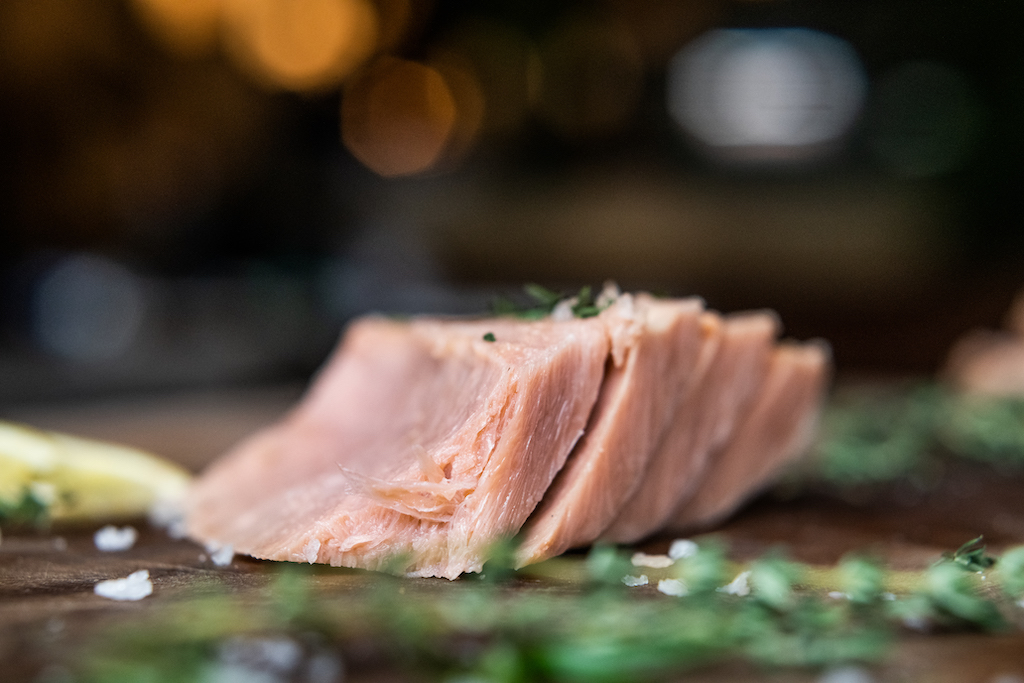
“We invested in New School Foods because they recognized that the existing production technologies in the plant-based meat industry are insufficient for creating a whole-cut product that consumers genuinely want to eat,” said Nick Cooney, General Partner at Lever Ventures. “Their technology is unlike anything else we’ve seen in the industry in terms of truly mimicking the texture, mouthfeel, and experience of cooking and eating whole cuts of meat.”
New School says the next frontier in meat successors is whole cuts. They represent the majority of animal meat sales but have proven challenging for the plant-based sector to mimic connective tissue, muscle fibers, and other microstructures in meat.
Consumers in North America could get a chance to taste New School Foods’ fish later this year; the company says it expects to launch its filet in select restaurants following the launch of a chef-only pilot program kickstarting its commercial efforts.
The post This Whole-Cut Raw Salmon Filet Is Made Entirely Out of Plants appeared first on Green Queen.
This post was originally published on Green Queen.
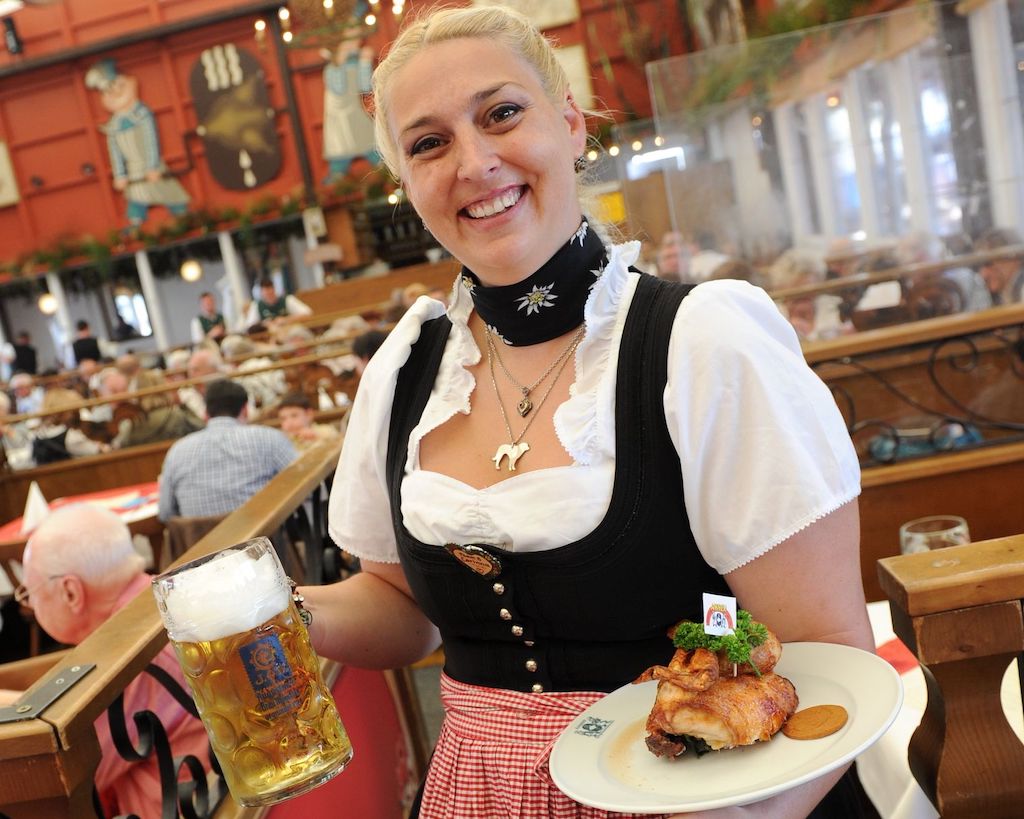
While the US mainstream media is on a headline rampage against plant-based meat, the US Department of Agriculture’s foreign arm is publishing reports extolling the growth of the plant-based meat sector abroad to encourage US plant-based meat brands to lean in to export markets like Germany. So I guess that means the USDA doesn’t think plant-based meat is a has-been ‘fad’ then. Or maybe their copy of Bloomberg BusinessWeek got lost in the mail? But I digress…
The USDA’s Foreign Agricultural Service has just published a 12-page report titled ‘Plant-Based Food Goes Mainstream in Germany’ aimed at boosting US exports of plant-based foods to the European country, which the authors described as “one of the most important markets for plant-based food worldwide.”
In the report’s synopsis, the authors write: “German food culture is changing. The number of vegans is growing, and more than half of the population wants to reduce meat consumption, considering themselves flexitarian.” Sprichst du Deutsch?
While the report details the rise of the vegan food movement in Germany and describes the typical vegan consumer, it does not delve into the specifics of how this cultural shift took place, though one noteworthy takeaway is that unlike in many other countries, Germany benefits from overt political will for reducing meat consumption.
Nonetheless, the report gathers many interesting data points, which we break down below.
55% or more than half of Germans describe themselves as “part-time vegetarians” or flexitarians, i.e. they are opting for less animal-based food on their plates. That’s close to 46 million people.
Germany has the highest rate of vegetarianism compared to its European neighbors. 8 million people followed a vegetarian diet, around 10% of the population. The number of vegans in Germany reached over 1.5 million people in 2022, compared to just 100,000 people 10 years ago – that’s an impressive 1,400% increase.
In 2011, Germans ate an average 138 pounds of meat each year. That number dropped to 121 pounds in 2021 or a 13% decrease. On the meat front, pork consumption is down by 23% (despite being Germany’s favorite meat), beef is stable and chicken is up by 13%.
Butter and milk consumption is down compared to 2021 levels (3% and 4% respectively) while cheese consumption is stable. 32% of consumers say that they will consume fewer dairy products (e.g., milk, yoghurt, cheese) in the next six months.
There is political support in Germany for reducing meat consumption- the Green Party is currently part of the ruling government coalition and the country’s Green Minister of Food and Agriculture nutrition strategy includes a focus on plant-based diets.
Further, NGOs in Germany are more vocal about reducing meat consumption than elsewhere- the report cites the German Fridays for Future Movement website which advocates for halving meat consumption by 2035 in contrast to the US Fridays for Future Movement, which does not say anything about meat! Calling Greta!
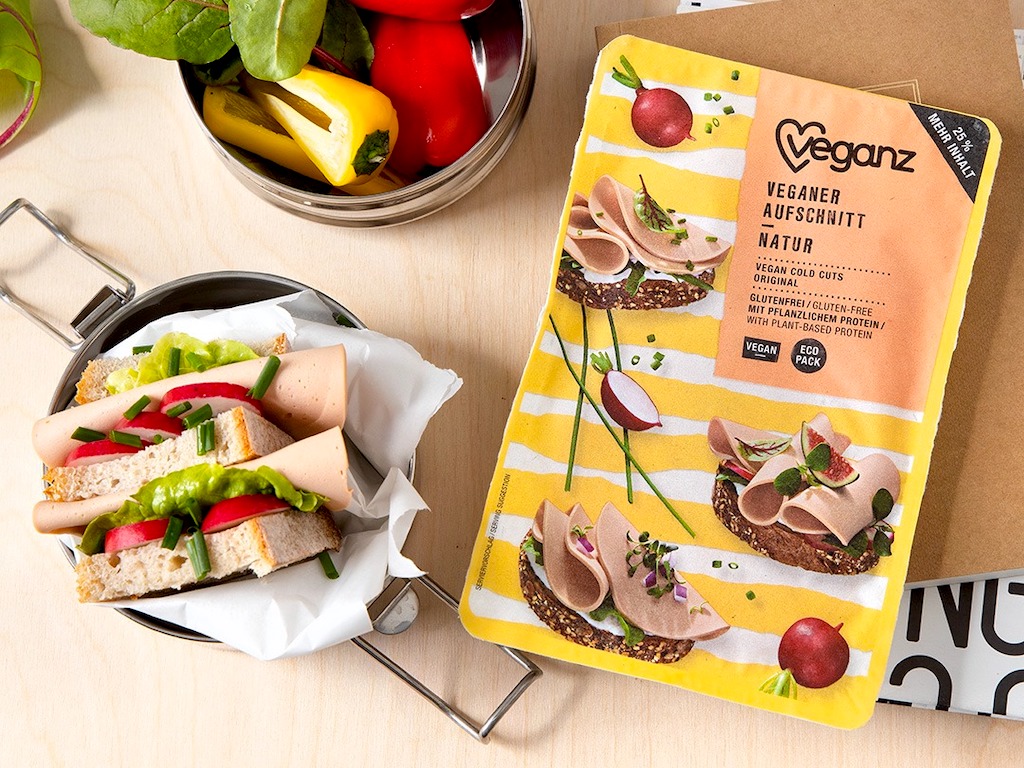
Germany is the fastest-growing plant-based meat market in Europe and one of the fastest-growing plant-based dairy markets in Europe. Earlier today, I was shown off the record data suggesting that the total German plant-based meat category was up between 11% and 16% YoY in the first half of 2022. Every supermarket in Germany stocks plant-based alternatives and almost every major fast food chain has plant-based menu items. Interestingly, Germans are the most likely to pay more for plant-based meat than animal meat compared to citizens of other countries.
Young Germans are driving the rise of flexitarianism, and seemingly bringing their parents along with them. The most commonly cited reasons for consumers to adopt a meat-free diet was moral or ethical in nature, with reasons that included animal welfare, climate conservation and industrial livestock farming. According to veggieworld, the average German vegan is female (81%), young (60% are between 20-39 years old), well-educated (70% have a high level of education), and has a high income.
Across Europe, consumers are eating less meat and are increasingly interested in plant-based foods.
A 2021 European survey byProVeg International and Innova Market Insights spanning 7,500 participants across 10 countries revealed that 46% of respondents had already cut their meat consumption, with just under 40% saying they plan on doing so in the future. The German data supports this trend.
This tracks with data from FMCG Gurus from last April around global consumer behavior trends, which stated that global consumers were planning to moderate their meat intake. 80% of the respondents said this was due to environmental concerns, while 74% felt that eating less meat was a healthier choice.
Earlier this year, the UK charity the Vegan Society shared the results of a survey they conducted of 2,000 participants: 33% of people said reducing or eliminating animal products is a priority in 2023 and 56% of non-vegans said they would decrease their animal product consumption.
Data analytics outfit Kantar just released its own report about French consumer spending habits in 2022. The report suggests that French people are buying less meat. While that’s good news for the planet, the planet is not their main motivation. Inflationary pressure is what’s keeping more French folks away from their steak hache.
That said, their consumption of plant-based alternatives (the exact wording used by the authors in French is “offres dites de transition alimentaire“, which loosely translates to “product selection aimed at the food transition”, but I am transliterating) is stable. The report states that despite rising food prices, eco-friendly, vegan and plant-based products continue to be popular since September 2022.
The post USDA Foreign Ag Service To US Plant-Based Brands: Export To Germany Where 55% Are Flexitarians appeared first on Green Queen.
This post was originally published on Green Queen.
Local diners just might think twice about chowing down on fried chicken after they see—and hear—“Hell on Wheels,” PETA’s new guerilla-marketing campaign featuring a life-size chicken transport truck covered with images of real chickens crammed into crates on their way to a slaughterhouse, complete with actual recorded sounds of the birds’ cries and a subliminal message every 10 seconds suggesting that people go vegan. It will debut by driving through the Route 66 Historic District and circling the Potter County Courts Building on Friday before moving on to confront diners at Texas Chicken Bowl, Golden Chick, Chicken Express, Chick-fil-A, and other eateries through Saturday as part of the group’s national tour.
When: Friday, February 3, 12 noon
Where: Potter County Courts Building, 501 S. Fillmore St., Amarillo
“Behind every barbecued wing or bucket of fried chicken is a once-living, sensitive individual who was crammed onto a truck for a terrifying, miserable journey to their death,” says PETA Executive Vice President Tracy Reiman. “PETA’s ‘Hell on Wheels’ truck is an appeal to anyone who eats chicken to remember that the meat industry is cruel to birds and that the kindest meal is a vegan one.”
PETA—whose motto reads, in part, that “animals are not ours to eat”—opposes speciesism, a human-supremacist worldview.
For more information, please visit PETA.org, listen to The PETA Podcast, or follow the group on Twitter, Facebook, or Instagram.
The post ‘Hell on Wheels’ Is Coming: Squawking Chicken Truck to Ruffle Feathers Outside Amarillo Restaurants appeared first on PETA.
PETA has just obtained U.S. Department of Agriculture (USDA) records that reveal a worker beating a pig at Bob Evans Farms in Xenia—the latest in a string of illegal horrors at the slaughterhouse. In response, the group fired off a letter today to the company’s president and CEO, Mark Delahanty, calling on him to livestream video footage from the slaughterhouse to help prevent additional egregious suffering.
On September 15, 2022, a USDA inspector saw a worker hit a sow “with excessive force on the side of the face” and then “use force while using both of his hands to quickly push [a metal] gate into the right side of the sow,” who cried out. The incident occurred just weeks after a trucker was spotted kneeling on the backs of crying sows and caps off years of workers ineffectively shooting animals and leaving them conscious—even while slashing one’s throat. In total, the slaughterhouse has been warned at least six times in recent years about violating federal law.
“This facility is hell on Earth for animals, where pigs have been abused and shot over and over as they scream,” says PETA Vice President Daniel Paden. “PETA is calling on Bob Evans Farms to livestream its operations publicly and reminds everyone that the only humane meal is a vegan one.”
PETA has also asked Delahanty to report the workers involved in the incidents to local law-enforcement officials and reassign those individuals to positions that don’t involve having contact with live animals.
PETA—whose motto reads, in part, that “animals are not ours to eat”—opposes speciesism, a human-supremacist worldview. For more information on PETA’s investigative newsgathering and reporting, please visit PETA.org, listen to The PETA Podcast, or follow the group on Twitter, Facebook, or Instagram.
PETA’s letter to Delahanty follows.
February 1, 2023
Mark Delahanty
President and CEO
Bob Evans Farms Inc.
Dear Mr. Delahanty:
Given the latest U.S. Department of Agriculture (USDA) reports detailing that a worker beat a sow, a truck driver kneeled on sows’ backs, and other problems at Bob Evans Farms’ slaughterhouse in Xenia, we ask that you immediately alter operations there in order to reduce animal suffering. A long history of alarming incidents at the facility underscores the need for significant changes:
Will you please publicly livestream video from all areas of this facility where live animals are handled? Workers might take their duty to handle animals lawfully more seriously if they knew caring people were watching. At the very least, will you reassign the staff referenced in the federal reports to jobs that don’t involve having contact with any live animals and report the involved personnel to local law enforcement for investigation for possible violations of Ohio’s anti-cruelty statute? Thank you for your consideration.
Sincerely,
Daniel Paden
Vice President of Evidence Analysis
Cruelty Investigations Department
The post Feds See Pigs Beaten and Repeatedly Shot; PETA Seeks Slaughterhouse Cameras appeared first on PETA.
This post was originally published on Animal Rights and Campaign News | PETA.

Oatly Group AB, the Swedish oat drink company that sells its plant-based dairy products across the world and that helped to popularize oat milk, announced today the introduction of climate footprint labeling for select products in North America, starting with the brand’s newly reformulated line of Oatgurts, a yogurt-like product made from oats.
While the company has been publishing product climate footprints for many of its products in Europe since 2021, this marks the first time that Oatly is releasing climate footprints for some of its products in North America. The company says this new addition to its product labels reflects its belief that consumer choice and education play a vital role in shaping the future of the food system.
Oatly’s product climate footprints are expressed in kilograms of carbon dioxide equivalents (CO2e) per kilogram of packaged food product and are calculated based on a life cycle assessment approach from ‘grower to grocer’.
According to the Oatly website, the footprints account for both the production and the distribution to market of a product, which can further be broken into the emissions cost of agriculture (including nitrous oxide from soils and carbon dioxide emissions from farm energy use, transport of ingredients, processing, packaging and distribution.
The calculations are validated through a partnership with the carbon footprint audit tool CarbonCloud, and it aggregates emissions into a single unit based on the amount of greenhouse gases emitted and their global warming potential over a 100-year period.
CarbonCloud, which like Oatly is headquartered in Sweden, works with other plant-forward food startups including Naturli, Tenzing, Naughty Nuts and Future Farm.
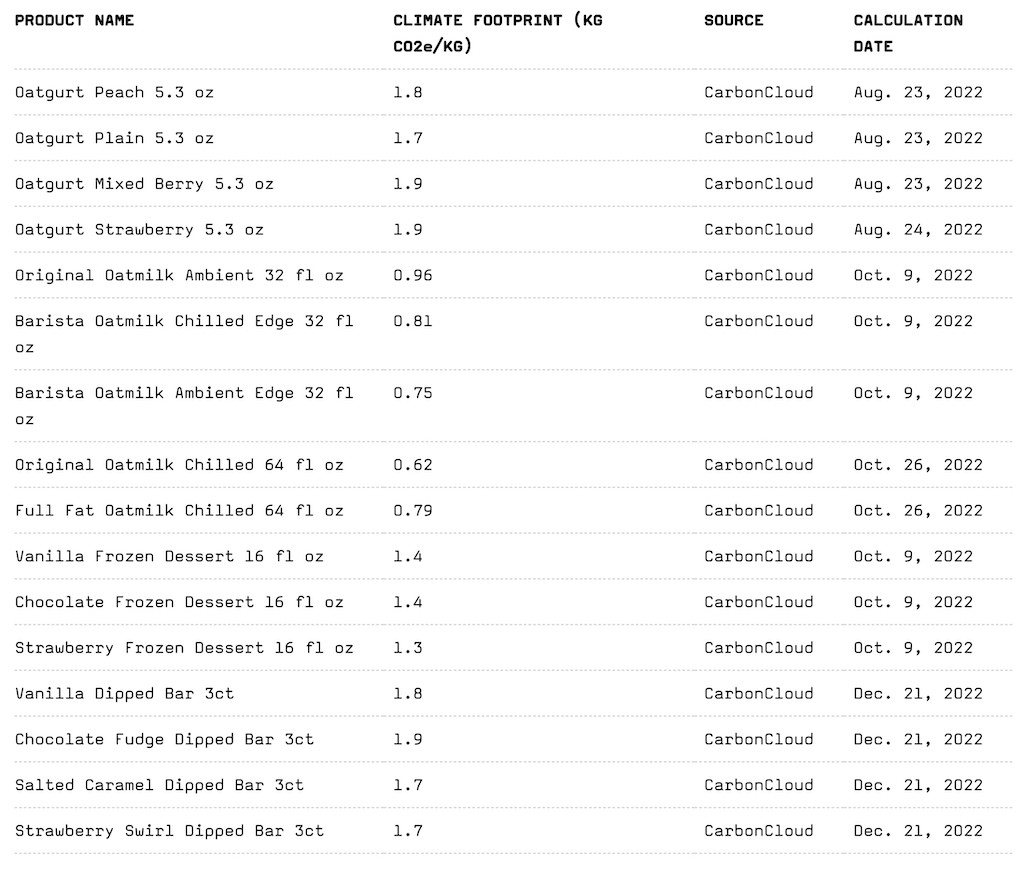
The Oatly website lists the climate footprint of 16 of its products as shown in the above table. The climate footprint for an Oatgurt pot ranges from 1.7 to 1.9 kg CO2e/kg. In comparison, the company’s Original Oatmilk Chilled is 0.62 kg CO2e/kg.
What is not disclosed is how these numbers compare to other foods and given that there is no industry agreed-upon standard, it can be difficult for a consumer to make comparative choices and for them to get an idea of what these numbers mean in the context of other daily habits such as taking public transportation or buying second hand clothing.
There is currently no standard methodology for CO2e labeling for food products. Oatly says it is committed to making products that are good for both people and the planet, and hopes that it will encourage other food companies to add climate information to their products.
“Transforming the food industry is necessary to meet the current climate challenge, and we believe providing consumers with information to understand the impact of their food choices is one way we as a company can contribute to that effort,” said Julie Kunen, Director of Sustainability at Oatly North America. “We’re motivated every day at Oatly to deliver products that are good for both people and the planet. We hope this next step of transparently bringing climate information to the forefront inspires other companies to do the same and helps consumers begin to recognize and learn about these indicators as they shop for their households.”
Climate labeling is not just a boon for consumers. It can help businesses achieve decarbonization targets. As Oxford University Professor Peter Scarborough, who has done research on eco-labeling systems, said in an interview: “Manufacturers, caterers and retailers have targets for reaching net zero [emissions] and they don’t have the tools they need to get there.”
Carbon labeling on food products is still in its very early stages but more and more food companies are adding this information to their packaging. In 2020, Unilever pledged to label all its 75,000 products and announced a pilot in the US and Europe but the FMCG giant has yet to fully roll out such labeling. In 2021, British energy drink maker Tenzing became the first soft drink brand to introduce carbon labeling to its products that same year and Brave Robot, the ice cream brand made from Perfect Day animal-free dairy proteins, also added carbon labeling to its pots. Last year, Nestlé and Sainsbury’s partnered with non-profit climate scoring tool Foundation Earth to trial traffic-light eco-labels to its products in the UK.
The revamped Oatgurts are the company’s first North American products to display the climate footprint on-pack. The newly reformulated range of plant-based yogurts, which are now available for retail across in stores across the US, feature fewer ingredients, new blended fruit formats instead of fruit at the bottom, and a new Vanilla flavor variety.
“The products we make at Oatly aim to make it easy for people to make the switch to non-dairy alternatives, and great taste is one of the most essential components of driving that conversion,” said Leah Hoxie, SVP of Innovation at Oatly North America. “This line of newly reformulated Oatgurts delivers on just that and more — deliciousness, great texture, and a variety of tasty flavors that people crave.”
The post Oatly Adds Climate Footprint To Revamped US Oatgurt Range To ‘Give Consumers Choices’ appeared first on Green Queen.
This post was originally published on Green Queen.
To help some of the 8 million California residents who live in food deserts, Council Member Kimberly Warmsley will join PETA on Thursday to give out free vegan chicken burritos and watermelon aguas frescas from Carlos Bryant’s Las Maris food truck as well as bags packed with fresh produce and nutritious vegan staples like tofu and lentils. This giveaway is part of PETA’s national food justice campaign, which aims to redirect the billions of dollars in subsidies for the meat, egg, and dairy industries toward incentives for grocers in food deserts to stock vegetables, fruits, and other healthy, humane, vegan foods.
When: Thursday, February 2, 12 noon–1 p.m.
Where: McKinley Park (at the parking lot at the southeast corner of S. El Dorado and E. Eighth streets), Stockton
“Food justice is a critical issue here in South Stockton, which, due in large part to meaty and cheesy fast food and the lack of availability of fresh produce, has some of the highest rates in the state of high blood pressure, diabetes, and childhood obesity,” says Warmsley. “With PETA’s help, we can build a healthier community by giving residents access to mock meats that deliver real benefits and to fresh fruits, vegetables, and other vegan foods that ‘health-up’ any’ menu.”
“Everyone deserves to have nourishing food that keeps them thriving instead of being limited to fast and processed fare full of animal-derived fat and cholesterol,” says PETA Senior Director Danielle Katz. “PETA’s food justice campaign empowers people to take action by contacting their representatives to demand equal access to healthy foods.”
Supporters can text JUSTICE to 73822 to call on state legislators to take action to save animals’ lives; help vulnerable communities reduce their rates of cancer, heart disease, and diabetes; and safeguard the planet, given that animal agriculture is responsible for nearly one-fifth of human-induced greenhouse gas emissions.
The U.S. government currently spends about $38 billion of taxpayers’ money each year subsidizing the meat, egg, and dairy industries—the vast majority of which goes to big corporations—while only about $17 million is used to subsidize the fruit and vegetable industries.
PETA—whose motto reads, in part, that “animals are not ours to eat”—opposes speciesism, a human-supremacist worldview. For more information, please visit PETA.org, listen to The PETA Podcast, or follow the group on Twitter, Facebook, or Instagram.
The post Council Member Kimberly Warmsley, Las Maris Food Truck to Join PETA to Fight Food Deserts appeared first on PETA.
This post was originally published on Animal Rights and Campaign News | PETA.
In response to a just-published report from the U.S. Department of Agriculture documenting that a cow, who remained conscious at FPL Food in Augusta after multiple shots to the head, was slashed across the throat and dragged away, PETA fired off a letter today to District Attorney Jared Williams calling on him to investigate and file applicable criminal charges against those responsible.
On August 24, a worker shot a cow twice in the head and cut her throat before she was shackled and dragged about 15 feet with a forklift. She continued to move, breathe, and blink. Workers did nothing to end her suffering until a federal inspector pointed out that she was still conscious.
“This cow endured prolonged, agonizing pain after she was shot twice, cut across the neck, and hauled around before finally being rendered unconscious,” says PETA Vice President Daniel Paden. “PETA is calling for an investigation on this animal’s behalf and urges everyone to help prevent animals from suffering in slaughterhouses by going vegan.”
Federal documents obtained by PETA reveal that FPL was flagged in prior years for the mistreatment of cows—including one who remained conscious and cried out after a worker shot her in the head and another who got loose, fell 6 feet onto a table, and ran through the slaughterhouse to the parking lot, where she was shot.
PETA—whose motto reads, in part, that “animals are not ours to eat”—opposes speciesism, a human-supremacist worldview. For more information on PETA’s investigative newsgathering and reporting, please visit PETA.org, listen to The PETA Podcast, or follow the group on Twitter, Facebook, or Instagram.
PETA’s letter to Williams follows.
January 31, 2023
The Honorable Jared Williams
District Attorney
Augusta Judicial Circuit
Dear Mr. Williams:
I hope this letter finds you well. I’m writing to request that your office (and a law-enforcement agency, as necessary) investigate and file applicable criminal charges against the individuals responsible for repeatedly shooting a cow in the head, slashing her throat, and dragging her 15 feet behind a forklift—while she was conscious—at FPL Food, located at 1301 New Savannah Rd. in Augusta. The U.S. Department of Agriculture’s Food Safety and Inspection Service (FSIS) documented the incident in a report that it recently made available to the public.
On August 24, 2022, an FSIS inspector saw an FPL worker shoot a recumbent cow—who was trapped in a trailer—in the head twice with a captive-bolt gun and then stick a knife into her throat in an attempt to bleed her to death. The FSIS inspector “was standing right next to the cow … and could see she maintained rhythmic breathing, and her breathing quickened when they used the knife on her.”
Even though the cow was conscious, workers shackled and dragged her about 15 feet with a forklift. The FSIS inspector then saw her sit up, blink her eyes, move her head, and look around. “The plant employees did nothing to render the cow unconscious,” the inspector wrote, “until I said to them the cow was conscious.” Finally, a third shot to the head stunned the cow.
This conduct may violate O.C.G.A. § 16-12-4 and does not represent the agricultural or butchering practices otherwise exempt from prosecution. Please note that FSIS’ action carries no criminal or civil penalties and does not preempt criminal liability under state law for acts of cruelty to animals.
Thank you for your time and consideration.
Sincerely,
Daniel Paden
Vice President of Evidence Analysis
Cruelty Investigations Department
The post Conscious Cow Repeatedly Shot and Dragged at FPL Food; PETA Seeks Criminal Probe appeared first on PETA.
This post was originally published on Animal Rights and Campaign News | PETA.
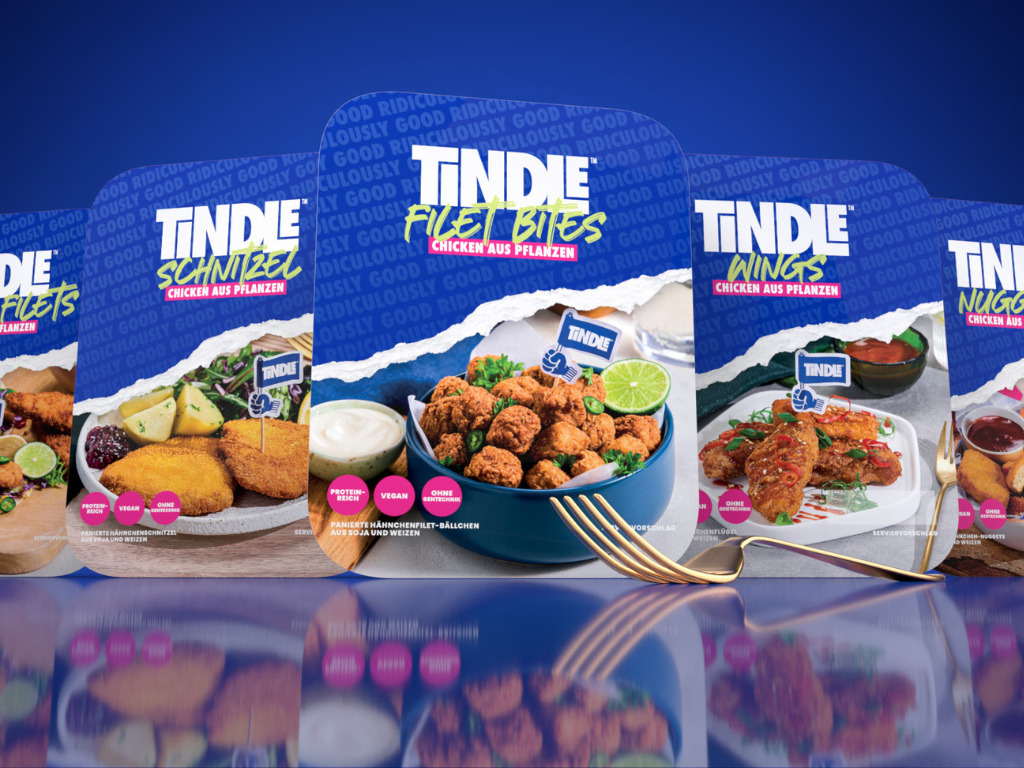
3 Mins Read
This is the first time the brand’s products will be available to consumers to cook at home, except for a brief limited three-product seasonal release at UK’s Morrisons supermarket chain for the 2023 Veganuary campaign.
“Our new line of grocery-ready products was created to be easy to prepare and convenient for everyday home cooking, but also intended to be blank canvases that can be elevated or dressed up if you wanted to make a gourmet meal at home,” Andre Menezes, co-founder and CEO of TiNDLE, told Green Queen via email.

Six new plant-based chicken product formats have been announced, including nuggets, sandwich patties, tenders, popcorn chicken and wings, as well as a traditional schnitzel, which is exclusive to the German market. The products will be priced at €3.49 and sold in the chilled aisle.
EDEKA, which operates over 11,000 stores in the country, will debut TiNDLE products in southwest Germany including Frankfurt this week, followed by major metropolitan areas like Berlin and Hanover starting next Monday. The group is also featuring the new range at its Netto Marken-Discount chain for a limited time until February 5th.
TiNDLE continues to be available in restaurants in various countries and Menezes told Greeen Queen that the company plans to continue growing its presence across both restaurants and grocery stores.
The company did not rush a retail launch, working instead with chefs across Europe, Asia and the United States to gather feedback on how the product performed during preparation and to “source open feedback and collect insights on best uses across dishes and cuisines, but also look at details related to flavor, shape, size, color, and more to further improve the overall TiNDLE experience.”
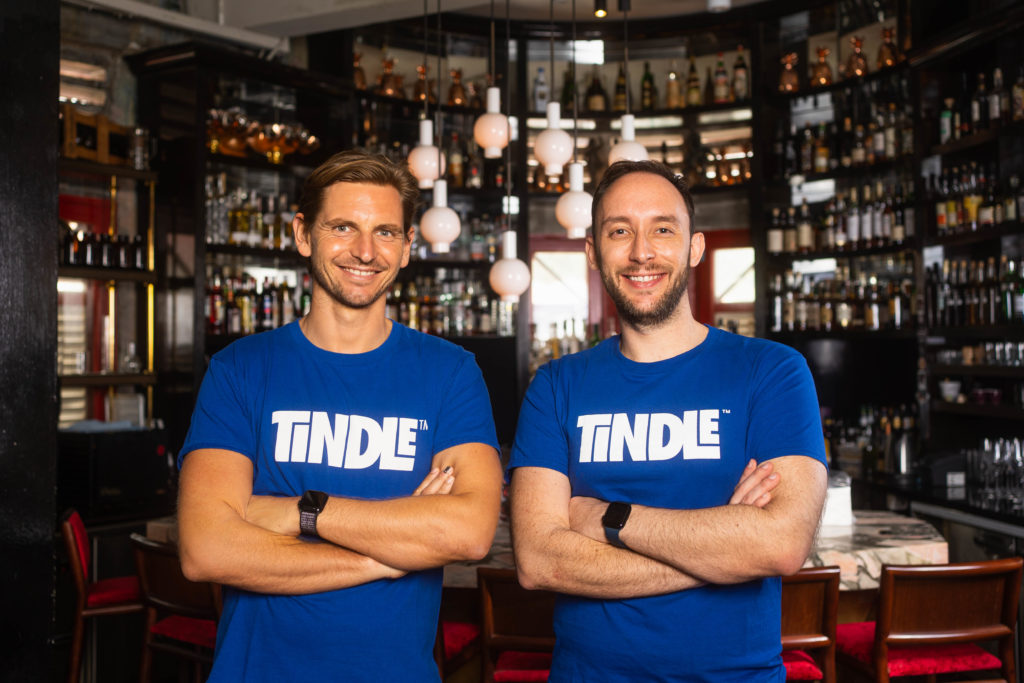
When asked about the perception that the plant-based meat sector is underperforming, Menezes said “we see our launch into thousands of retail outlets as a strong indicator that the category is continuing to grow.”
He added that “change in our food system happening over decades and not immediately overnight…Such a paradigm shift is not easy even on an individual level, let alone on a broader society.”
Pressed further, Menezes said the criticism of the sector is “a short-sighted evaluation of larger market conditions today, including how the market is reacting to inflation, rising interest rates, and geopolitical tensions. These are factors that have influenced market conditions today, but don’t necessarily correlate to larger macro trends and what will be key to longer-term change in our food production processes.”
In addition to the Germany news, TiNDLE is trialing a limited edition range of meal kits created in collaboration with celebrity chef Chad Rosenthal on direct-to-consumer marketplace Goldbelly including a Buffalo Chicken Tenders Wrap Kit, a Chicken Sandwich Kit, a Chicken Sandwich Kit and a Sweet Honey BBQ Chicken Wings Kit ahead of an anticipated US retail launch later this year.
TiNDLE’s products are made entirely of non-GMO plant ingredients and offer consumers 17g of protein and 8g of fiber per 100g serving. They also include Lipi , the company’s proprietary chicken-fat-like emulsion that contributes the aroma and savoriness of its animal counterpart.
, the company’s proprietary chicken-fat-like emulsion that contributes the aroma and savoriness of its animal counterpart.
Next Gen Foods was founded in 2020 by Timo Recker and Menezes to “reduce humanity’s reliance on animal agriculture.” The startup has raised over $130 million dollars since, including the largest Series A round in plant-based meat history.
The post TiNDLE Launches 6 New Plant-Based Chicken Products At 6,000+ German Grocery Stores appeared first on Green Queen.
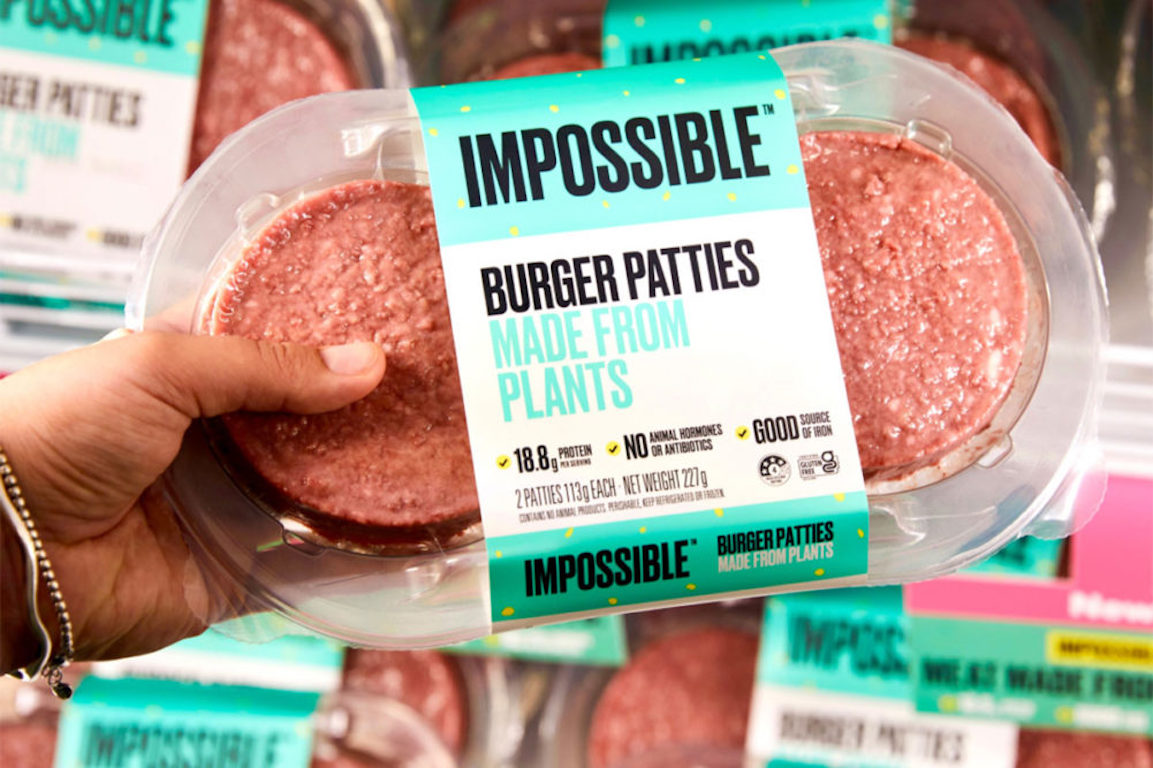
Very few additional details about the layoff announcements are available though the reporter did write that the same source said the company “offered voluntary separation payments and benefits to employees at the end of 2022” and that Bloomberg viewed internal documents that confirmed separation packages. Impossible has yet to officially confirm or deny the news.
Editor’s Note: Green Queen has reached out to Impossible Foods for comment and this piece will be updated with new information.
The maker of the Impossible Burger announced a 6% job cut in October of last year, which it attributed to company restructuring; CEO Peter McGuinness said in a memo the axed roles had either “become redundant to others in the organization” or “no longer aligned with our core business priorities.”
Earlier this month, Bloomberg BusinessWeek dropped a controversial cover story in its print edition decrying plant-based meat a failed ‘fad’, which drew backlash and extended commentary. In response, Impossible took out a cheeky advert in The New York Times and published a heated reply titled “Bloomberg was supposed to report the facts. It just became another opinion piece” on their website, describing the piece as “pages rife with one-sided anecdotes and editorialized framing” and concluded: “the reality is that the plant-based meat category is still young and yet to be fully defined. We’re proud of our leadership in the category, even if that means we take the heat sometimes.”
In a TIME interview about the Bloomberg BusinessWeek piece that came out two days ago in which the reporter described McGuiness as “hopping mad”, he said of the fad accusation: “We’re in a category that is in first gear. It hasn’t even been created yet, and people are trying to say that it’s the death of it, or it’s a fad. In the beginning, the internet was a fad. In the beginning, cars were a fad and horses were going to stay. Electric cars were a fad. I just don’t like the implication, nor do I think it’s accurate.” He added that Impossible Foods currently has 17% consumer awareness, noting that “83% of the country’s never even heard of us…95% of the country hasn’t even tried us yet, and we’re still growing at those growth rates.”
Despite flat or declining North American grocery sales for the plant-based meat sector, Impossible shared it had achieved a 50% increase in US retail sales in 2022, a year that saw it debut vegan beef in Australia and New Zealand, partner with Kroger on co-branded vegan meat products, expand its Burger King partnerships to include its plant-based chicken patties, launch its chicken nuggets in Hong Kong and add more foodservice offerings to its lineup aimed at school systems and other public procurement channels. Two weeks ago, Impossible collaborated with 7-Eleven Canada on the retail chain’s first plant-based breakfast sandwich featuring Impossible Sausage at 550 stores nationwide.
Sausage at 550 stores nationwide.
In addition, the company beefed up its C-Suite, adding former SVP and General Manager at Newell Brands Sherene Jagla as its inaugural Chief Demand Officer, Leslie Sims as its first Chief Marketing and Noel Clark as Senior Vice President of International. In April 2022, Impossible’s founder Pat Brown stepped down as CEO and McGuiness, formerly COO at Chobani Foods, stepped in to run the startup.
Competitor Beyond Meat, whose stock price continues to take a beating, also announced layoffs this past October, removing 19% of its workforce amidst “cost-reduction initiatives intended to reduce operating expenses.”
The post Anonymous Source Suggests Impossible Foods Laying Off 20% Of Its Workforce appeared first on Green Queen.
This post was originally published on Green Queen.
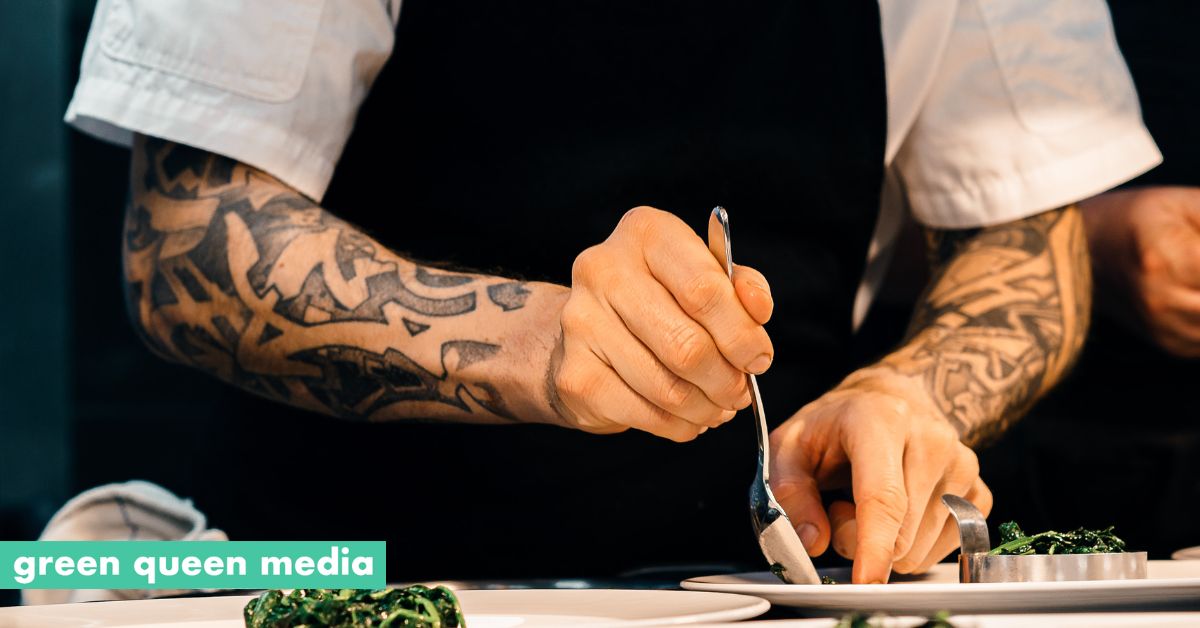
Despite US alternative protein retail sales last year dipping for a number of brands including category leader Beyond Meat, experts still predict big things for the category. At the front lines of the shift, chefs are embracing plant-based alternatives and many are pledging to bring cultivated protein to menus once approved.
German food and beverage-focused GEA Group recently polled 1,000 chefs from 11 countries including Brazil, China, Denmark, Germany, India, Israel, the Netherlands, Singapore, South Korea, UK and the U.S. about the changes to the protein category. According to the survey, 90 percent of chefs said they’ve seen a growing interest in alternatives from their patrons, with more than 40 percent saying that interest is increasing.
“Considering that chefs not only earn their living via food but, in many cases, define themselves in terms of their devotion to food and culinary traditions, one might expect a healthy dose of skepticism when it comes to alternative proteins,” reads the report. But, GEA says that while its survey did uncover some skepticism, “these were decidedly in the minority.”
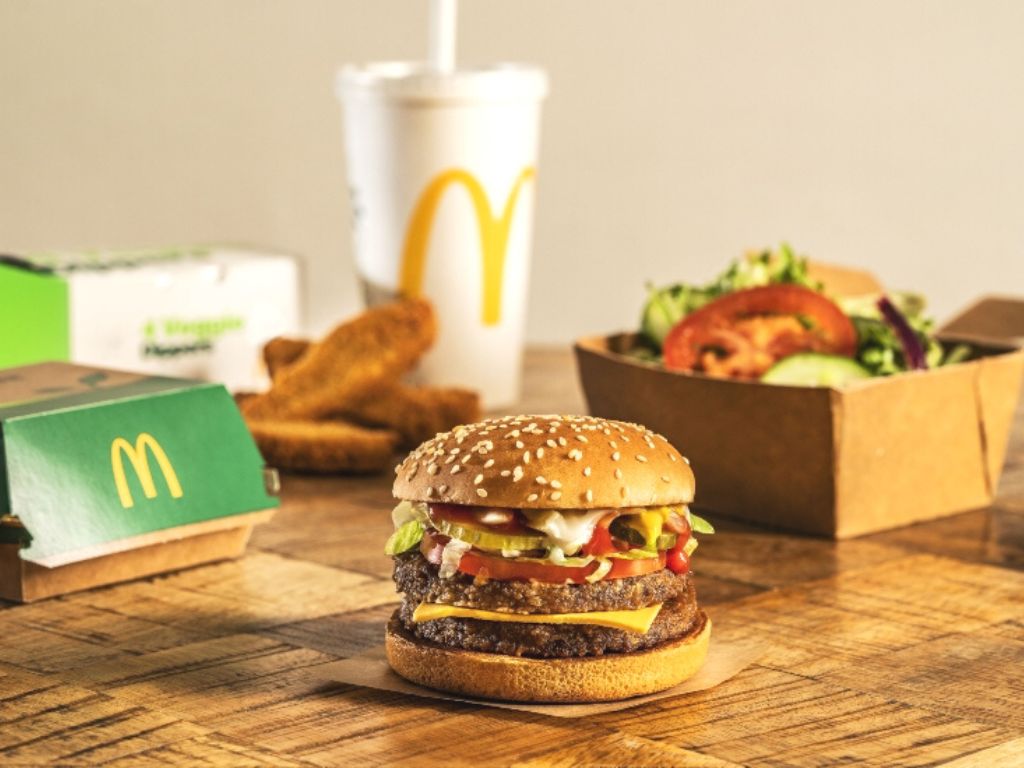
“In fact,” reads the report, “the large majority of chefs surveyed are familiar with the various types of alternative proteins and already using them in their kitchens.”
Only two percent of chefs surveyed said they had “never heard” of plant-based food, while six percent said they had no real knowledge of the alternatives. But an overwhelming 92 percent said they were familiar with plant-based foods and beverages, and a majority (63 percent) said that they know a lot about them.
Cultivated meat, which is only currently approved for sale and consumption in Singapore, also showed surprising levels of awareness among the chefs despite its lack of availability. Eighty percent of the chefs said they were familiar with cultivated meat, with 41 percent claiming to know a lot about the tech.
Nearly 25 percent of the chefs surveyed said they expect new foods including protein and dairy successors to constitute more than 50 percent of all food by 2040, with An additional 43 percent of respondents saying 25 percent to 50 percent of all food by 2040 will be made up of alternatives and new tech.
According to the findings, that shift is well underway with 90 percent of chefs saying they’re already using some forms of protein and dairy successors, with more than 33 percent using them at high frequencies. While egg and seafood alternatives are the lowest on their radar, 30 percent of chefs said they’re using them at high levels.
“If there is one message to take from the survey, it’s that most chefs around the world are definitely not waiting around; they have begun making the transition to new foods,” reads the report.
The findings mirror other research that shows demand is increasing among consumers. A 2022 Boston Consulting Group survey found more than 50 percent of consumers use alternative proteins occasionally and 35 percent use them frequently, with 13 percent identifying as “exclusive or near-exclusive” users.
The shift is especially strong in Europe, with a 2022 survey from The Good Food Institute finding 50 percent of consumers in Spain and Italy are eating plant-based meat monthly.
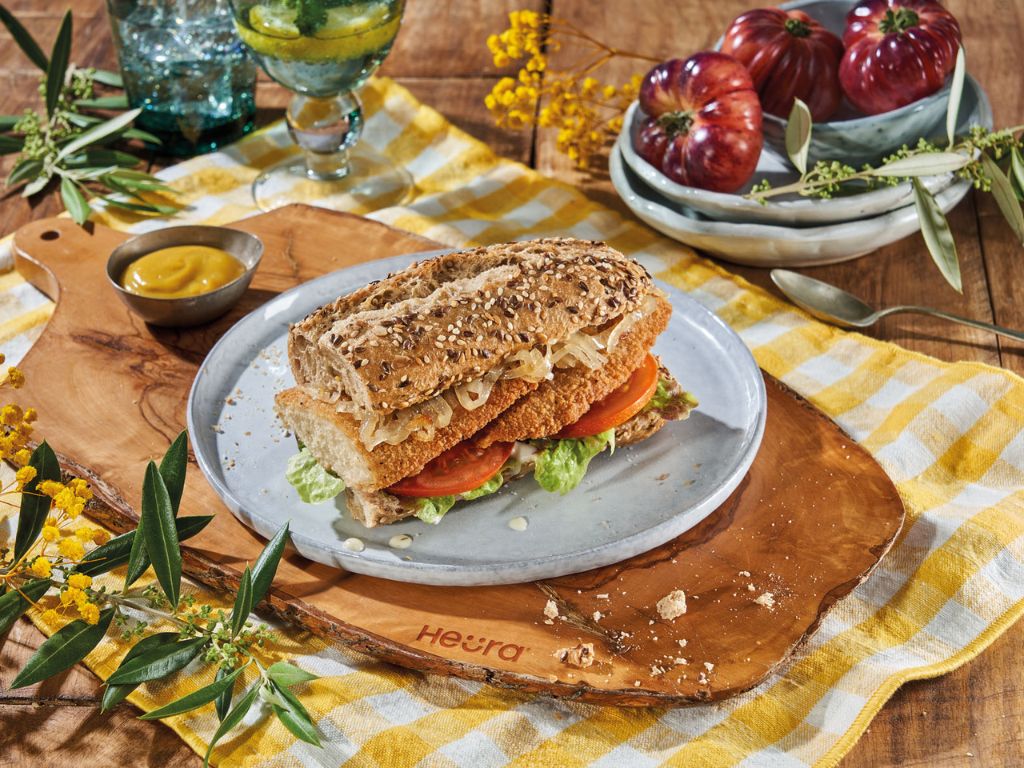
GEA’s survey found chefs feel the responsibility of food choices; 75 percent said they consider it a very important factor in human health and 62 percent consider it very important for the health of the planet. A growing number of chefs are reducing their own meat consumption, the survey finds. Thirty-three percent say they’re reducing their own meat intake and 15 percent identified as vegan or vegetarian. Further, 96 percent of the chefs surveyed said their restaurants are working to reduce their environmental footprints, with 44 percent working to “a great extent” on the issue.
“The overall level of interest among chefs in using alternative proteins reinforces a growing body of data that tells us the following: new food is not just a possibility,” reads the report, “but the emerging new reality.”
The post Chefs Aren’t Just Ready for Alternative Protein, They’re Leading the Shift: Survey appeared first on Green Queen.
This post was originally published on Green Queen.
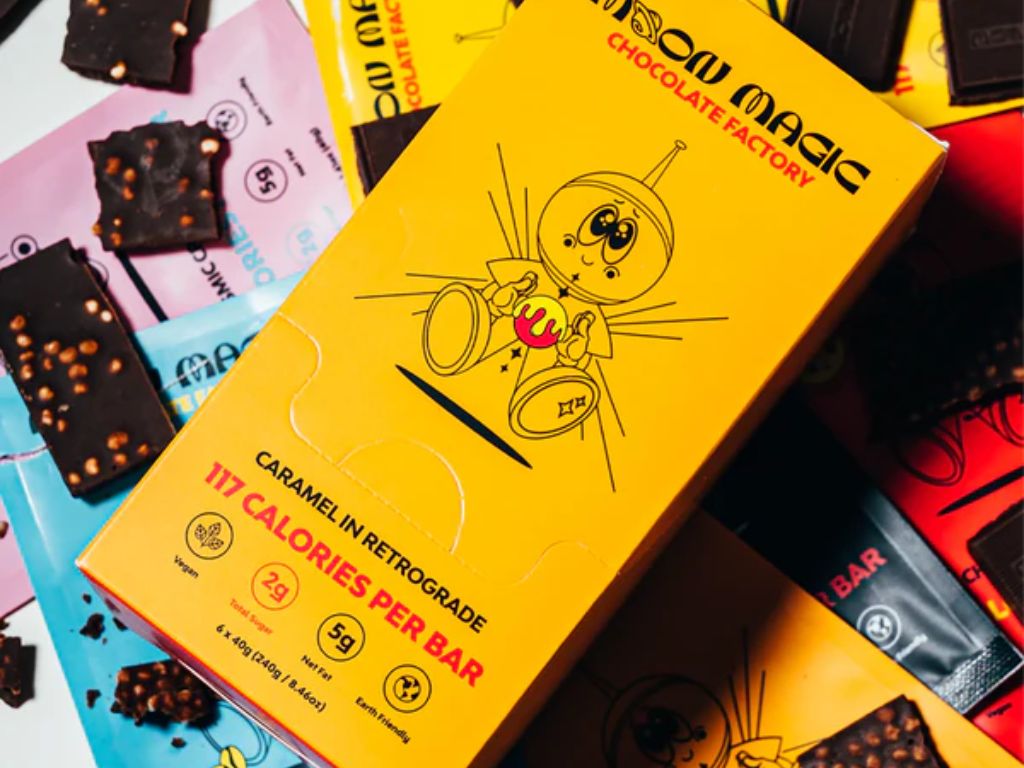
According to Moon Magic, while the good-for-you chocolate market has increased recently, much of those offerings are still high in sugar and calories, which can negate the benefits of chocolate.
Chocolate is a rich source of antioxidants, vitamins, and minerals, but experts say chocolate diluted by dairy reduces those benefits. Likewise, sugar can make chocolate a high-calorie food and increases the risk of type-2 diabetes and obesity, among other issues.
“The entire goal of this product line and brand is to change what has been ‘too good to be true’ in the past into a reality,” Shawn Brown, Founder of Moon Magic, said in a statement. Brown says Moon Magic is poised to disrupt the $113 billion global chocolate market.

“Feeling guilty for consuming ‘treats’ is what I have set out to change — without sacrificing on taste, texture, and experience — and while never wavering from ingredient quality and quantity goals. The entire concept is for consumers to ‘have it all’ when it comes to chocolate confections. We aim to revolutionize the chocolate confections industry, worldwide,” Brown says.
Moon Magic says its 45-gram chocolate bars contain just 117 calories and 2 grams of sugar, which come from the oat milk. Its debut range includes Cosmic Crunch (Crisp puffed rice), Java Rock (Crunchy coffee-flavored), Caramel in Retrograde (Salted caramel), Tropic of Coconut (Shredded coconut and quinoa), and Cherry’s Comet (Cherry forward chocolate), which Brown says are inspired by popular chocolate bar flavors of childhood.
Moon Magic uses allulose, a sugar found in dried fruits and maple syrup that’s not metabolized by the body, delivering a net carb impact of zero.
The company says it also eschews preservatives, chemicals, and a long list of “strange ingredients.” Moon Magic says it works with purist chocolatiers in order to ensure the result is similar to high-quality Swiss chocolate.
Moon Magic joins an emerging low-calorie chocolate category. Lily’s, a popular sugar-free confectionery brand, uses stevia in its chocolate bars. ChocZero uses monk fruit.

The category is also seeing a move away from dairy. California’s TCHO chocolate recently announced its shift to a fully vegan brand. And last year, leading chocolate brand Mars announced a partnership with Perfect Day, using its precision fermentation dairy in place of conventional milk.
The brand WNWN is ditching chocolate altogether, using a proprietary blend of ingredients that it says deliver the taste and texture of chocolate but bypassing the environmental and ethical complications of the conventional chocolate industry.
The post Moon Magic Takes on Big Chocolate With Low-Sugar, Dairy-Free ‘World’s First’ appeared first on Green Queen.
This post was originally published on Green Queen.
Today PETA fired off a letter to Paul Kiecker, administrator of the Food Safety and Inspection Service at the U.S. Department of Agriculture (USDA), condemning the agency’s failure to refer abuse documented at Pudliner Packing outside Johnstown for criminal prosecution and asking that it do so immediately. The letter comes on the heels of newly released records revealing a cow’s injury at the local slaughterhouse after her leg got caught between a truck and a loading dock, causing her to fall “completely down” onto her stomach and limp once she got back up.
This slaughterhouse has been found to have violated federal law at least 13 times since June 2019. The August 2022 injury is the latest in a string of animal welfare violations. Previous incidents include repeatedly shooting a pig and several cows in the head up to four times, cutting the throat of one cow while she was conscious and crying out, confining animals without water on multiple occasions, and causing animals to fall on hazardous surfaces.
“The USDA’s toothless response to these repeated violations emboldens slaughterhouses like Pudliner to continue abusing and neglecting animals,” says PETA Vice President Daniel Paden. “PETA is calling on the USDA to enforce the law and refer all intentional cruelty and egregious abuse for criminal prosecution.”
The group explains that in the 44 years that violations of the Humane Methods of Slaughter Act have been subject to criminal sanctions under the Federal Meat Inspection Act, there is no evidence of a single instance in which the USDA worked with the Department of Justice to file criminal charges against a licensed slaughterhouse.
PETA—whose motto reads, in part, that “animals are not ours to eat”—opposes speciesism, a human-supremacist worldview. For more information on PETA’s investigative newsgathering and reporting, please visit PETA.org or follow the group on Twitter, Facebook, or Instagram.
PETA’s letter to Kiecker follows.
January 26, 2023
Paul Kiecker
Administrator
Food Safety and Inspection Service
U.S. Department of Agriculture
Dear Mr. Kiecker:
I hope this letter finds you well. I’m writing to you to follow up on the petition for rulemaking that PETA and others submitted to the Food Safety and Inspection Service (FSIS) to, among other things, amend agency regulations requiring that all intentional cruelty and egregious or reckless abuse be referred for criminal prosecution in light of FSIS’ apparent failure to ever exercise its discretion to do so.
Specifically, the petition notes that FSIS has effectively eliminated criminal sanctions for licensed establishments by apparently never referring abuse for prosecution. Since submission of the petition, FSIS’ abdication of duty has continued to result in substantial animal suffering. This is demonstrated clearly by Pudliner Packing, in Johnstown, Pennsylvania, which FSIS has cited for at least 13 violations of the Humane Methods of Slaughter Act (HMSA) since June 26, 2019. Given the remarkable history of persistent, egregious violations of law at Pudliner Packing—and the extensive pain and suffering they have caused—we urge FSIS to refer this matter for federal criminal charges immediately.
Your personnel have documented the following incidents in the attached reports.
FSIS claims that “[i]nvestigators from [its] enforcement division and from USDA’s Inspector General … stand ready to work”14 with U.S. attorneys to prosecute violations of the HMSA. However, we are unaware of even one instance in which FSIS collaborated with the Department of Justice (DOJ) to file criminal charges against a licensed slaughterhouse in the 44 years that violations of the HMSA have been subject to criminal sanctions under the Federal Meat Inspection Act (FMIA). The FMIA classifies such offenses as misdemeanors and provides penalties of imprisonment of up to one year and/or a fine of up to $1,000.15
The fact that inhumane handling has persisted at Pudliner Packing for so long under your agency’s watch makes it abundantly clear that FSIS’ 13 enforcement and other actions are woefully ineffective. Absent the long-overdue referral of this and many other matters for criminal prosecution, Pudliner Packing—and the rest of the nation’s licensed slaughterhouses—is emboldened by FSIS’ toothless responses and continues to violate the HMSA, with no fear of penalties or significant consequences.
Criminal prosecution is in the best interests of the animals slaughtered at Pudliner Packing as well as the American public. Accordingly, we ask that FSIS forward all its enforcement actions, noncompliance records, and memorandums of interview related to this establishment to the U.S. Department of Agriculture’s Office of the General Counsel or Office of Inspector General for referral to U.S. Attorney for the Western District of Pennsylvania Cindy K. Chung. It’s time for the DOJ to bring criminal charges against all those responsible for this astounding history of violations—and for FSIS to exercise its authority by finally and regularly holding those who abuse and neglect animals in violation of federal law accountable in a meaningful and effective way. We also urge you to take action immediately to implement the revisions to agency regulations proposed by the 2015 petition to ensure that existing laws and policies are actually enforced.
Thank you for your consideration of this important matter.
Sincerely,
Colin Henstock
Investigations Project Manager
1Food Safety and Inspection Service, Noncompliance Record, Pudliner Packing (Aug. 17, 2022) https://www.peta.org/wp-content/uploads/2023/01/pudliner-packing-noncompliance-records.pdf. Last accessed January 24, 2023.
2Food Safety and Inspection Service, Noncompliance Record, Pudliner Packing (Nov. 24, 2021) https://www.peta.org/wp-content/uploads/2023/01/pudliner-packing-noncompliance-records.pdf. Last accessed January 24, 2023.
3Food Safety and Inspection Service, Noncompliance Record, Pudliner Packing (Nov. 23, 2021) https://www.peta.org/wp-content/uploads/2023/01/pudliner-packing-noncompliance-records.pdf. Last accessed January 24, 2023.
4Food Safety and Inspection Service, Noncompliance Record, Pudliner Packing (Nov. 22, 2021) https://www.peta.org/wp-content/uploads/2023/01/pudliner-packing-noncompliance-records.pdf. Last accessed January 24, 2023.
5Food Safety and Inspection Service, Noncompliance Record, Pudliner Packing (Nov. 19, 2021) https://www.peta.org/wp-content/uploads/2023/01/pudliner-packing-noncompliance-records.pdf. Last accessed January 24, 2023.
6Food Safety and Inspection Service, Noncompliance Record, Pudliner Packing (Nov. 9, 2021) https://www.peta.org/wp-content/uploads/2023/01/pudliner-packing-noncompliance-records.pdf. Last accessed January 24, 2023.
7Food Safety and Inspection Service, Noncompliance Record, Pudliner Packing (Nov. 3, 2021) https://www.peta.org/wp-content/uploads/2023/01/pudliner-packing-noncompliance-records.pdf. Last accessed January 24, 2023.
8Food Safety and Inspection Service, Noncompliance Record, Pudliner Packing (July 15, 2021) https://www.peta.org/wp-content/uploads/2023/01/pudliner-packing-noncompliance-records.pdf. Last accessed January 24, 2023.
9Food Safety and Inspection Service, Noncompliance Record, Pudliner Packing (June 11, 2021) https://www.peta.org/wp-content/uploads/2023/01/pudliner-packing-noncompliance-records.pdf. Last accessed January 24, 2023.
10FSIS District 60 Manager Dr. Lynda Lilyestrom, Reinstatement of Suspension, Pudliner Packing (Nov. 16, 2020) https://www.peta.org/wp-content/uploads/2023/01/4999-noros-11162020.pdf. Last accessed January 24, 2023.
11FSIS District 60 Manager Dr. Lynda Lilyestrom, Notice of Suspension, Pudliner Packing (Aug. 11, 2020) https://www.peta.org/wp-content/uploads/2023/01/4999-nos-08112020.pdf. Last accessed January 24, 2023.
12FSIS District 60 Manager Dr. Lynda Lilyestrom, Reinstatement of Suspension, Pudliner Packing (Jan. 27, 2020) https://www.peta.org/wp-content/uploads/2023/01/4999-ros-012720.pdf. Last accessed January 24, 2023.
13FSIS District 60 Manager Dr. Lynda Lilyestrom, Reinstatement of Suspension, Pudliner Packing (June 26, 2019) https://www.peta.org/wp-content/uploads/2023/01/4999-noros-062619.pdf. Last accessed January 24, 2023.
14U.S. Department of Agriculture, FSIS, “Under Secretary for Food Safety Shares Some Insight on the Humane Handling of Livestock,” (Jan. 7, 2011) https://www.usda.gov/media/blog/2011/01/7/under-secretary-food-safety-shares-some-insight-humane-handling-livestock. Last accessed January 24, 2023.
15U.S. Congress, United States Code: Meat Inspection, 21 U.S.C. §§ 676(a), (1982) https://www.govinfo.gov/content/pkg/USCODE-2010-title21/pdf/USCODE-2010-title21-chap12-subchapIV-sec676.pdf. Last accessed January 24, 2023.
The post PETA Blasts USDA’s Toothless Response to Local Slaughterhouse Cruelty appeared first on PETA.
This post was originally published on Animal Rights and Campaign News | PETA.